- Home
- Ann M. Martin
Happy Holidays, Jessi Page 3
Happy Holidays, Jessi Read online
Page 3
Becca and I were struggling to keep our eyes open. So far, we hadn’t gone to any of the departments we needed to go to.
“This is so boring,” Becca complained.
I was gazing through a Plexiglas barrier into the section next to us. I could see a rack labeled “Jokes ‘n’ Notions” near a huge sign that said PARTY GOODS.
Aunt Cecelia and the manager were still fussing. Squirt was out cold, making little baby-snores.
I pulled Becca by the sleeve. “We’ll be right back,” I called out to Aunt Cecelia’s back.
We ran around the Plexiglas divider into the party goods area.
“Yuck!” Becca said, pulling a plastic bloody eye out of a bin.
I found a rubbery tarantula and shook it so that it quivered. “Aaahh, it’s alive!”
Becca screamed.
I looked through the Plexiglas. Now Aunt Cecelia was yelling at two managers. Both of them were nodding like animated dolls.
I strapped on a fake Santa beard and a plastic pig snout. Becca donned a pair of glasses with a mustache and a hat of foam plastic that looked as if an axe were embedded in it.
We were howling.
Then I caught a glimpse of two sales clerks looking at us. They were giggling, too.
“Let’s scare Aunt Cecelia,” Becca said behind her mustache.
“She’s in a sour mood,” I said.
“She always is! This will make her laugh.”
Becca walked around the Plexiglas barrier. She crouched behind a stack of food processors a few feet away from Aunt Cecelia.
I followed. Through a gap between the boxes we could see one of the managers hanging up the phone and smiling weakly at Aunt Cecelia. “You’re in luck, ma’am,” he said. “The factory has a few of the old model in storage, and they’ll send one to us right away.”
“Of course they will. I’ll be back.” Without a good-bye, Aunt Cecelia turned and pushed the stroller in our direction. “Jessica? Rebecca?”
I put my hand on Becca’s shoulder. Just a few more steps and Aunt Cecelia would be in the perfect place, right in front of us.
“… no sense of discipline whatsoever …” Her voice was coming closer. “I don’t know why I bother to —”
Now.
“Boooo!”
“Oh!” Aunt Cecelia put her hand over her chest and staggered backward. “Oh, mercy! Oh!”
Becca burst into giggles. “Surprise!”
Squirt awoke with a start. “Eeeee!” he cried, twisting under his strap.
For a moment Aunt Cecelia didn’t say a word. She glowered at Becca, then at me, her lips pursed tightly.
I knew that look. We were dead meat.
“Follow me,” Aunt Cecelia snapped, pushing the stroller toward the exit. “We are leaving.”
I pulled off my disguise. “Why?”
“Sorryyyyy,” Becca pleaded.
“Eeeeeee!” Squirt screamed.
“And you better return that merchandise!” Aunt Cecelia called over her shoulder.
Becca and I ran back to the party section. We dumped our disguises and followed Aunt Cecelia.
“But we didn’t buy anything!” Becca protested.
Aunt Cecelia stared straight ahead without replying.
“Please, Aunt Cecelia?” I begged.
Aunt Cecelia marched forward like a wooden soldier. Squirt was squalling, probably wet and hungry. Becca began crying.
As we charged through the exit, a Salvation Army Santa was ringing a bell. “Ho ho ho!” he boomed. “Merry Christmas!”
Aunt Cecelia ignored him. She went straight to the car.
But just before we reached it, she stopped in her tracks and gasped, “Well, of all the nerve …”
Neatly folded under the windshield wiper was a white parking ticket.
I wanted to say “I told you so,” but I kept my mouth shut.
Sometimes it’s better to quit while you’re behind.
“It’s perfect!” Kristy said. “I mean, all the Kwanzaa principles are right there —”
Claudia was shaking her head. “No, Kristy.”
“Unity … self-determination …” Kristy counted out the words on her fingers.
“The history of the Baby-sitters Club,” Abby said, “is not the right topic for a Kwanzaa skit.”
“Cooperative economics …” Kristy continued, “collective work and responsibility … purpose … Hey, those concepts are the BSC!”
We all stared at her, stunned.
“The kids could play themselves,” Kristy barged on. “Think of the great publicity!”
“Kristyyyyy …” Mary Anne said warningly.
Claudia’s clock clicked to five-thirty. “Well, we’re off to a good start,” Kristy said. “I call this meeting to order!”
“Chow time!” Claudia announced, pulling a bag of Cape Cod potato chips out of her pillowcase.
“Dues!” Stacey added.
We quickly paid up and grabbed some chips. Kristy was munching away, finally silent.
I reached into my backpack for a pile of Kwanzaa books I’d borrowed from the library. Mallory and I had gone there two days earlier, after the awful trip to Bellair’s.
All weekend long we’d read up on Kwanzaa and African-American stories. That day at lunch we’d come up with a great idea for a skit.
“Jessi and I did some research,” Mallory began.
“This book is great,” I said, leafing through Her Stories, by Virginia Hamilton. “It’s all folktales and stories about African-American women.”
“Research for what?” Kristy asked.
“The play,” Mal replied.
“But — but what about my idea?” Kristy sputtered.
“Save it for Hollywood,” Abby suggested.
“Have some more chips, Kristy,” Claudia said.
Kristy scowled and slumped into her chair.
“I was thinking of this story called ‘Malindy and Little Devil.’ ” I found an illustration from it and held up the book. “It’s about this farm girl who meets the devil on a road.”
“But he’s a little devil,” Mal continued, “doing his first devilment. He’s never had a soul and he wants one desperately. So he makes Malindy promise to give him hers when she reaches womanhood.”
“And she does,” I added.
Total, baffled silence.
“That’s it?” Stacey asked.
“At least the history of the BSC has a happy ending,” Kristy grumbled.
“So does this,” I continued. “See, when the devil finally comes to collect, Malindy hands him what he asked for. A sole … from her shoe!”
“Ohhhhhh,” groaned Abby and Claudia.
“He doesn’t know any better,” Mallory said. “So he kind of scratches his head, duhhh —”
“And Malindy skips away, free as a bird,” I concluded.
Stacey laughed out loud. “All riiight, Malindy.”
“The kids will adore it,” Mary Anne said with a smile.
“Some of the smaller or shyer kids can play animals who live on Malindy’s farm,” I suggested.
Kristy was nodding her head slowly. “Not bad, but it’s missing something …”
“How many kids have volunteered to be in this?” Abby asked.
“I’ll find out when I talk to Becca,” I replied.
Kristy blurted out, “I’ve got it! As a young woman, Malindy belongs to an organization of baby-sitters. The day she has to give her soul away, the sitters come up with the shoe idea at a meeting —”
“Attack!” Claudia grabbed a pillow and threw it at Kristy.
“What?” Kristy said, cowering. “What’d I say?”
Rrrring!
Claudia picked up the phone. “Hello, Baby-sitters Club!” she said sweetly.
Well, the phone hardly stopped ringing for the rest of the half hour. In between calls, we made plans.
We decided to set aside certain weekend days for festival rehearsals. Claudia volunteered to make fliers and
posters. Kristy promised she’d force Charlie to drive her around into the surrounding towns, where she’d post fliers wherever she could. (You see, Kristy does have good ideas.)
After the meeting, I was flying. My little idea was going to come true. I jetéd all the way home.
“I’m ho-o-o-ome!” I sang as I opened the front door.
Hurricane Becca nearly knocked me over. “They can do it they can do it! All the kids want to be in the festival!”
“Yaaaay!” I grabbed Becca and started dancing across the room.
We stopped when we ran smack into Aunt Cecelia at the kitchen door.
“Ahem,” she said. “Do you girls expect the salad to make itself?”
I could see Mama and Daddy preparing dinner at the kitchen counter. “Hug time first!”
Becca and I ran into the family room to hug Squirt, who was in his playpen. Then I went back to the kitchen to help.
I told Mama and Daddy all about our plans. I mentioned the kids Becca had involved and described “Malindy and Little Devil.”
They both thought the idea was fantastic. (I knew they would.)
I could hear Aunt Cecelia’s orthopedic shoes click-clacking dully on the kitchen floor behind me. “And what does this story have to do with Kwanzaa?” she asked.
“Well, I guess you could say it’s about self-determination,” I replied.
“Creativity,” Mama said. “She had to outfox the devil.”
“You know, not everything has to be strictly about Kwanzaa,” I explained. “The festival is really a celebration of African-American culture.”
“Mm-hm,” Aunt Cecelia grunted. “And you couldn’t have picked something a little more serious?”
I shrugged. “Well, this is a folktale. The hero is a little girl. The kids’ll like it —”
“When I was young,” Aunt Cecelia plowed on, “I played Harriet Tubman in a school play. That was educational. I still remember my speech. I memorized it in front of a mirror, so I could hone my facial expressions. I did not make one mistake. When I was through, people’s eyes were red.”
“That’s because they’d been napping,” Daddy murmured.
“Pardon me?” Aunt Cecelia said.
“Uh, they couldn’t stop clapping,” Daddy shot back.
Becca came running into the kitchen, carrying a huge collage on a sheet of oaktag. Squirt followed close behind.
“Ta-da!” Becca sang, holding up her artwork.
It was a collection of toy and clothing advertisements from catalogs and magazines. They were carefully cut up and pasted closely together, with the prices circled in red. Loops of rolled-up masking tape were on the back.
“Now no one has to ask me what I want for Christmas,” she exclaimed. “It’ll be right here in the kitchen.”
“Who-o-o-oa,” Daddy said. “Santa’s going to need extra reindeer, just for you.”
“No such thing,” Becca announced, pressing the sheet onto the kitchen wall.
“What are you doing?” Aunt Cecelia bellowed. “Do you know how hard it is to get rid of tape marks? Your parents spent good money on that wallpaper.”
“It’s all right, Cecelia,” Mama said gently.
“Oh?” Aunt Cecelia snapped. “Who’s the one who will have to scrub off the glue when that poster is removed?”
Daddy took a deep breath. “Cecelia, I’ll do it. It’s the holidays, remember? The season for love and compassion?”
“And the season for spoiling small children, too, I suppose?”
“Excuse me?” Daddy asked.
Aunt Cecelia turned to leave the kitchen. “I’ll wash John Philip’s hands.”
“Excuse me?”
Uh-oh. Daddy was using the Boom voice. It’s so loud, it must begin down at his toes. The last time I’d heard it was the time Becca flushed a twenty-dollar bill down the toilet.
Aunt Cecelia turned back around. “I said, I’ll wash —”
“No, before that!” Daddy barked.
Mama put her hand on Daddy’s shoulder. “John, it’s okay.”
“I’ll take down the poster,” Becca volunteered.
“You will not!” Daddy retorted. “Jessica, Rebecca, will you please go to the family room?”
Zoom. We were out of there in a nanosecond. We shut the family room door and pressed our ears to it.
“Cecelia, this house belongs to me and my family,” Daddy began. “You are living here as a guest —”
“Guest?” Aunt Cecelia huffed. “For heaven’s sake, John, I am your sister!”
“Of course you are, Cecelia,” Mama interrupted. “And we all love you —”
“But like it or not, you must abide by the rules of our house,” Daddy went on, “not make them. We decide how our walls are treated. And more importantly, we decide how our children should be raised. You are not their mother.”
“All right, John,” Aunt Cecelia snapped. “You’ve made your point.”
“Look, Cecelia, I don’t mean to lose my temper,” Daddy said firmly, “but I would like to see some changes around here. Loosen up with the kids. Don’t expect them to be perfect, miniature grown-ups. Keep them from harm, guide them — but allow them to be kids, to make a mistake here and there.”
“John,” Aunt Cecelia replied softly, “you’re expecting me to be somebody I’m not.”
“No,” said Daddy. “I am asking that you do that as long as you live in this house.”
Mary Anne is so polite. If I had been sitting that day, I’d be pulling my hair out.
And not because of the glitter.
The Harrises are an African-American family who live in Stoneybrook. Omar is seven years old, and his brother, Ebon, is six. An aunt lives with them, too, like Aunt Cecelia. She usually baby-sits, so none of us had sat for the boys before. On that day, though, the aunt was visiting relatives.
Mary Anne thought: new client. Not used to non-family sitters. Possible shyness. Clinginess. Tantrums.
She went to the job prepared. She brought along a Kid-Kit, stocked with appropriate stuff. She told herself not to take it personally if the kids had separation anxiety.
When Mr. and Mrs. Harris met her at the door, she was all smiles.
“Hello, I’m Mary Anne Sp —”
“Yaaaaaaay, the baby-sitter!” A small boy darted toward her and grabbed her hand. “You’re helping with the Kwanzaa festival.”
“It’s nice to meet you,” Mrs. Harris said. “Now, we do have a no-TV rule on school days —”
“Come on!” Omar was trying to yank Mary Anne across the living room. “We can do some Kwanzaa stuff now!”
“Uh, Omar?” Mrs. Harris said. “Would you mind giving us a chance to meet the young woman?”
Omar dropped Mary Anne’s hand. “I’ll call my friends! They can come over, too.”
“Art projects are fine,” Mrs. Harris continued. “It’s okay to have friends over, no sugary snacks before dinner …”
As the parents rambled on, Ebon quietly walked in. He stood at his mother’s side, shyly staring at Mary Anne.
Mary Anne smiled to reassure him.
He walked toward her and wrapped his arms around her legs. “You’re nice.”
Two for two. So much for new client-itis.
The Harrises left, and Omar raced in from the kitchen. “They’re coming! They’re coming! Okay, what are we going to do?”
“Uh, well, I don’t really know that much about Kwanzaa yet,” Mary Anne said. “The first get-together for the festival is this Saturday —”
“We have books,” Ebon exclaimed. “Come on.”
Mary Anne followed the boys into the family room. They ran straight for the bookshelf, which lined one entire wall.
Omar grabbed two books: The Seven Days of Kwanzaa, by Angela Shelf Medearis, and Crafts for Kwanzaa, by Kathy Ross.
Mary Anne opened one of the books and began leafing through it. Ebon stopped her at a page that described how to make a mkeke mat, a special kind of place mat for the Kwanz
aa table.
“That looks cool,” he said.
Mary Anne read through the instructions. “The basic idea is to weave red and green paper strips through cuts in a sheet of black paper. So we need construction paper, glue, and scissors.”
Omar and Ebon dug into an art box and pulled out all the necessary stuff. Then they went to the kitchen.
Soon, seven-year-old Sara Ford and her nine-year-old brother Marcus arrived. Then Bob and Sharelle Ingram. (He’s seven and she’s five.)
The Fords and the Ingrams are African-American families I didn’t know well. Like the Harrises, they live in Kristy’s neighborhood and attend Stoneybrook Academy, which is a private school. (Meeting new African-American Stoneybrookites was one of the nicest things about the Kwanzaa festival.)
The noise level in the kitchen had jacked up to high. Mary Anne’s baby-sitting job had suddenly turned into a small day-care center.
“I do the cutting!” Marcus called.
“They’re my scissors!” Omar retorted.
“So, you get to use them all the time?” Bob said.
“One at a time,” Mary Anne said, picking up a sheet of black construction paper. “First of all, each of you should fold one of these in half, lengthwise.”
“Ewwwww, Ebon’s eating the glue!” Sharelle cried.
Ebon grinned. “It says ‘nontoxic.’ I was just tasting it.”
“Not a good idea,” Mary Anne said.
A black paper airplane whizzed by her face. Marcus was giggling like crazy.
“Marcus!” Sara yelled. “You’re supposed to make mats!”
“Can I make a plane, too?” Ebon blurted out.
“Hey, cool, look at this!” Omar was pointing to a page in the book entitled “Foil Cup.”
“Let’s do that!” Bob cried.
“Foil cup … let’s see …” Mary Anne looked at the instructions. “You need a cardboard tube from a toilet paper or paper towel roll, tinfoil, and an egg-shaped container that may be cut from an egg carton …”
“I can get tubes,” said Ebon, running off.
Sharelle was deep into the other Kwanzaa book. “Toe puppets!” she cried out. “That’s what we should make!”

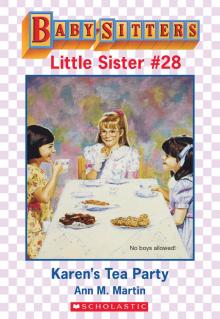 Karen's Tea Party
Karen's Tea Party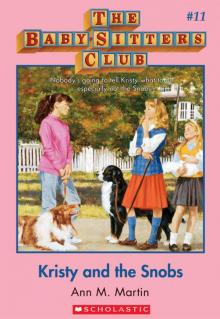 Kristy and the Snobs
Kristy and the Snobs Best Kept Secret
Best Kept Secret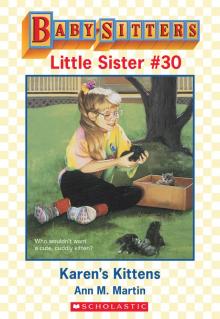 Karen's Kittens
Karen's Kittens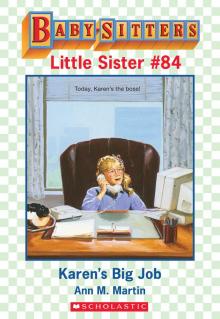 Karen's Big Job
Karen's Big Job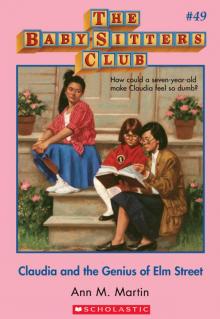 Claudia and the Genius of Elm Street
Claudia and the Genius of Elm Street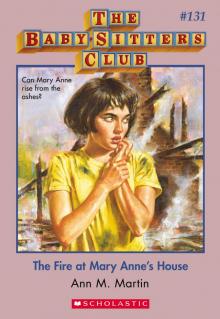 The Fire at Mary Anne's House
The Fire at Mary Anne's House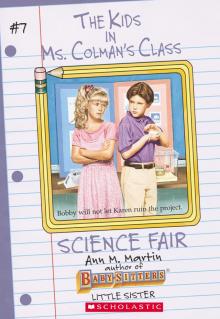 Science Fair
Science Fair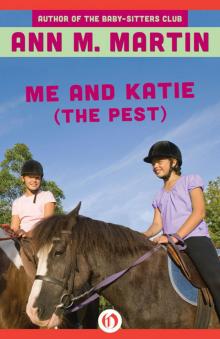 Me and Katie (The Pest)
Me and Katie (The Pest)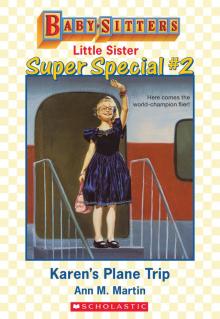 Karen's Plane Trip
Karen's Plane Trip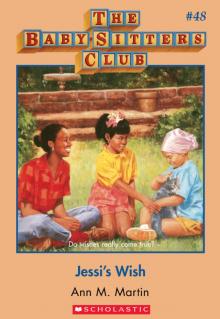 Jessi's Wish
Jessi's Wish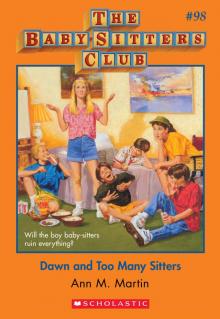 Dawn and Too Many Sitters
Dawn and Too Many Sitters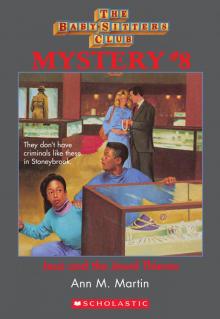 Jessi and the Jewel Thieves
Jessi and the Jewel Thieves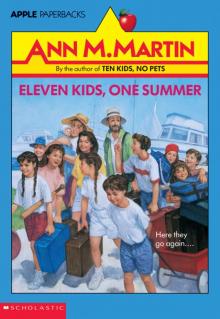 Eleven Kids, One Summer
Eleven Kids, One Summer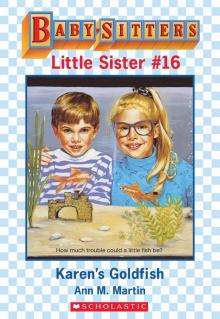 Karen's Goldfish
Karen's Goldfish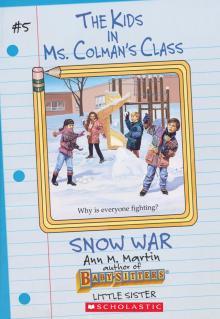 Snow War
Snow War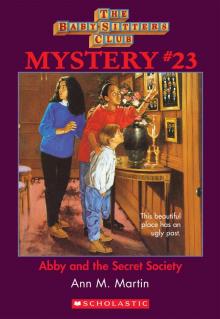 Abby and the Secret Society
Abby and the Secret Society Keeping Secrets
Keeping Secrets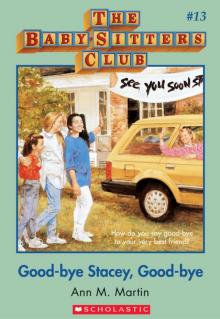 Good-Bye Stacey, Good-Bye
Good-Bye Stacey, Good-Bye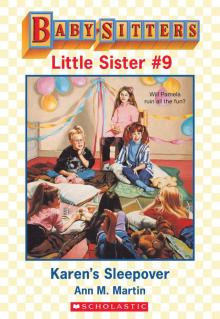 Karen's Sleepover
Karen's Sleepover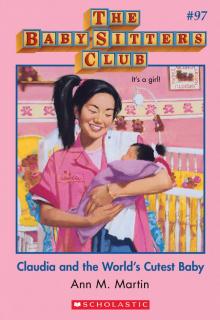 Claudia and the World's Cutest Baby
Claudia and the World's Cutest Baby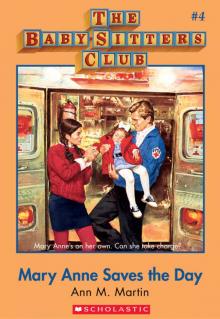 Mary Anne Saves the Day
Mary Anne Saves the Day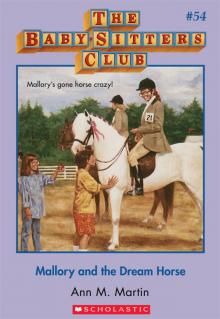 Mallory and the Dream Horse
Mallory and the Dream Horse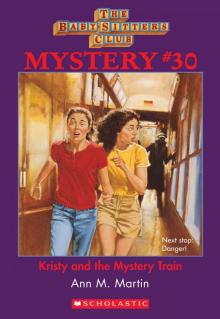 Kristy and the Mystery Train
Kristy and the Mystery Train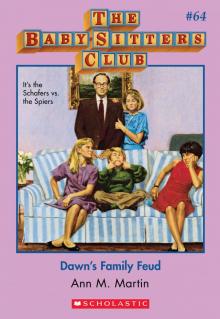 Dawn's Family Feud
Dawn's Family Feud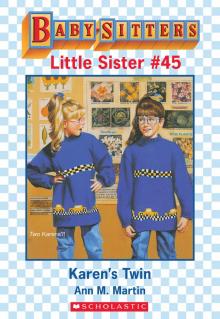 Karen's Twin
Karen's Twin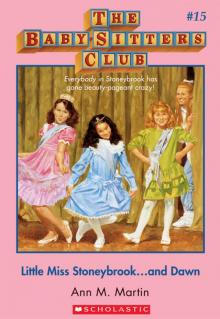 Little Miss Stoneybrook... And Dawn
Little Miss Stoneybrook... And Dawn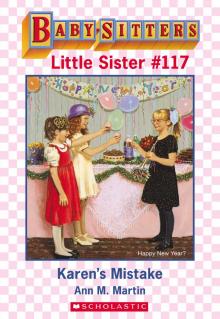 Karen's Mistake
Karen's Mistake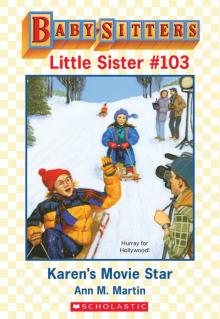 Karen's Movie Star
Karen's Movie Star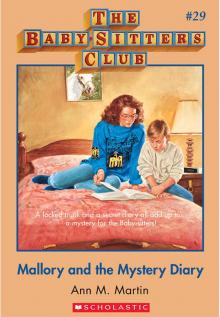 Mallory and the Mystery Diary
Mallory and the Mystery Diary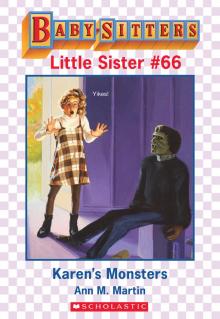 Karen's Monsters
Karen's Monsters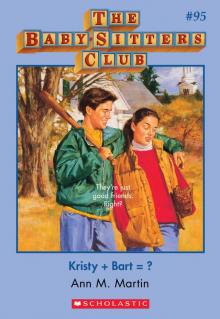 Kristy + Bart = ?
Kristy + Bart = ?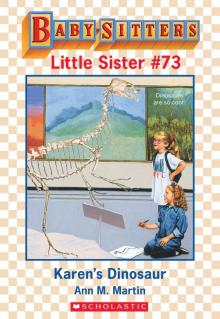 Karen's Dinosaur
Karen's Dinosaur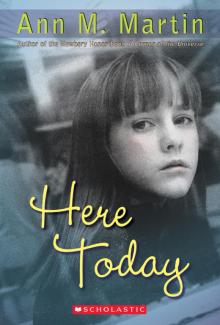 Here Today
Here Today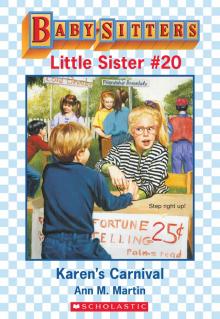 Karen's Carnival
Karen's Carnival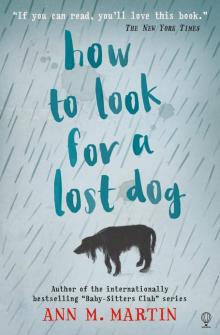 How to Look for a Lost Dog
How to Look for a Lost Dog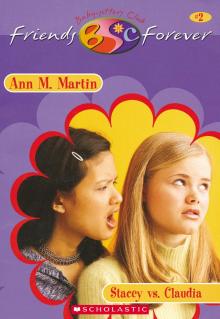 Stacey vs. Claudia
Stacey vs. Claudia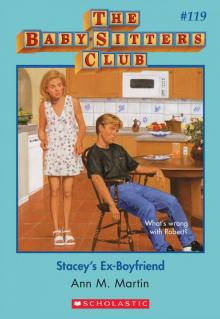 Stacey's Ex-Boyfriend
Stacey's Ex-Boyfriend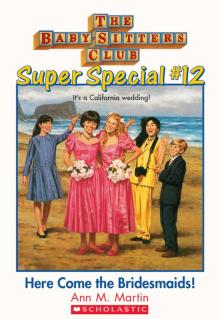 Here Come the Bridesmaids!
Here Come the Bridesmaids! Graduation Day
Graduation Day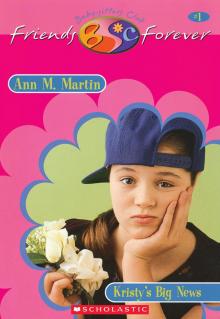 Kristy's Big News
Kristy's Big News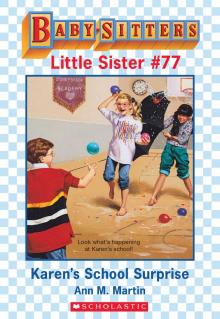 Karen's School Surprise
Karen's School Surprise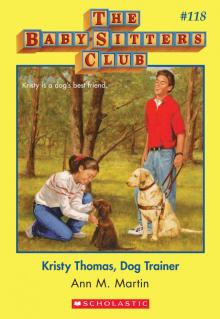 Kristy Thomas, Dog Trainer
Kristy Thomas, Dog Trainer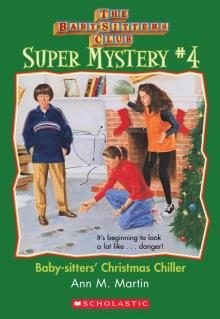 Baby-Sitters' Christmas Chiller
Baby-Sitters' Christmas Chiller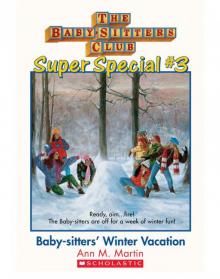 Baby-Sitters' Winter Vacation
Baby-Sitters' Winter Vacation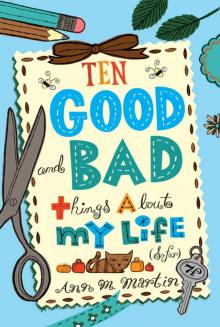 Ten Good and Bad Things About My Life
Ten Good and Bad Things About My Life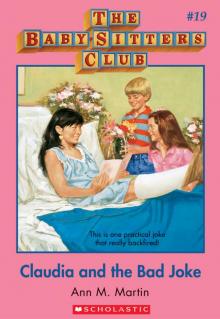 Claudia and the Bad Joke
Claudia and the Bad Joke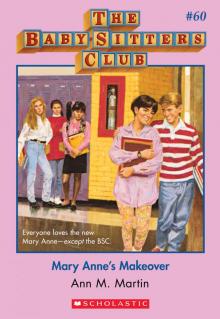 Mary Anne's Makeover
Mary Anne's Makeover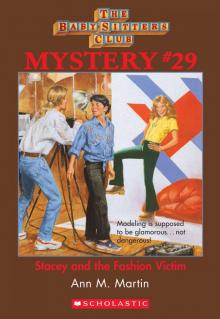 Stacey and the Fashion Victim
Stacey and the Fashion Victim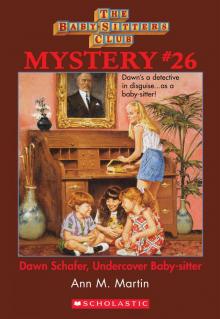 Dawn Schafer, Undercover Baby-Sitter
Dawn Schafer, Undercover Baby-Sitter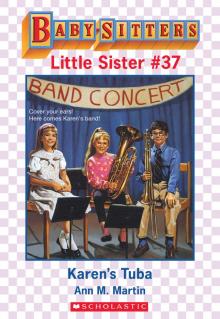 Karen's Tuba
Karen's Tuba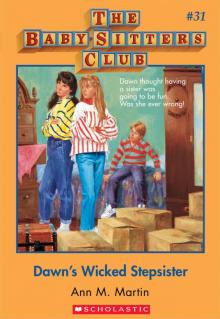 Dawn's Wicked Stepsister
Dawn's Wicked Stepsister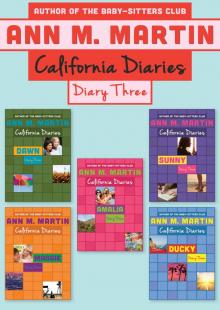 Diary Three: Dawn, Sunny, Maggie, Amalia, and Ducky
Diary Three: Dawn, Sunny, Maggie, Amalia, and Ducky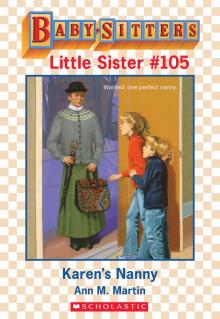 Karen's Nanny
Karen's Nanny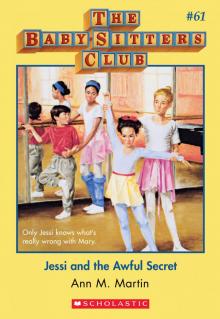 Jessi and the Awful Secret
Jessi and the Awful Secret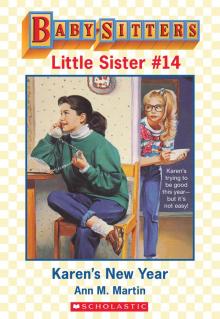 Karen's New Year
Karen's New Year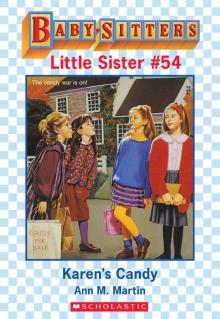 Karen's Candy
Karen's Candy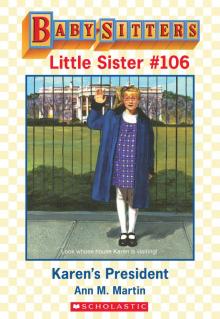 Karen's President
Karen's President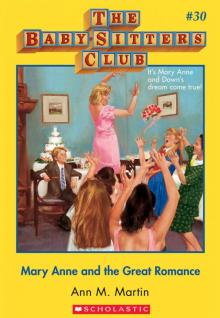 Mary Anne and the Great Romance
Mary Anne and the Great Romance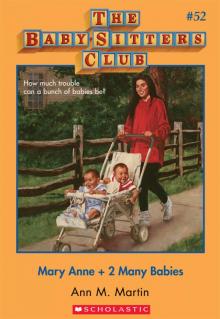 Mary Anne + 2 Many Babies
Mary Anne + 2 Many Babies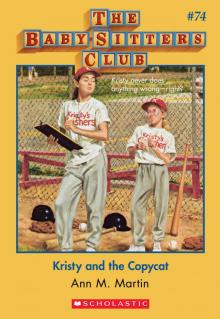 Kristy and the Copycat
Kristy and the Copycat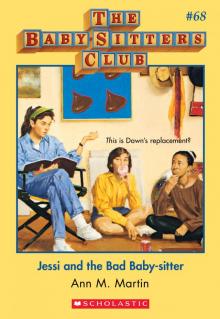 Jessi and the Bad Baby-Sitter
Jessi and the Bad Baby-Sitter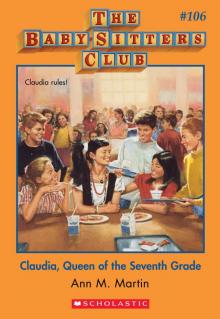 Claudia, Queen of the Seventh Grade
Claudia, Queen of the Seventh Grade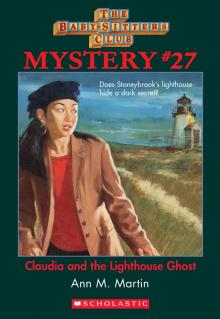 Claudia and the Lighthouse Ghost
Claudia and the Lighthouse Ghost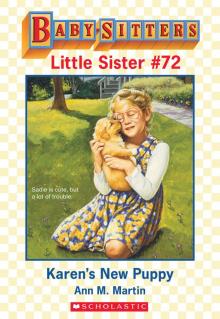 Karen's New Puppy
Karen's New Puppy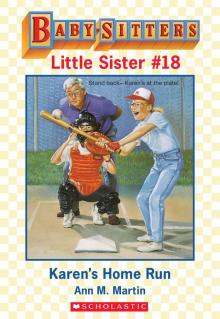 Karen's Home Run
Karen's Home Run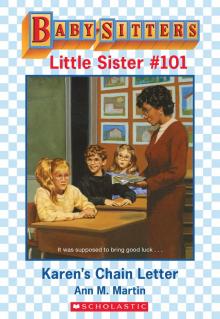 Karen's Chain Letter
Karen's Chain Letter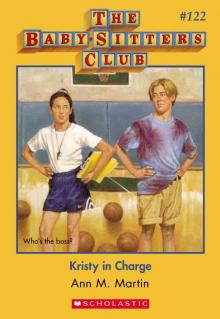 Kristy in Charge
Kristy in Charge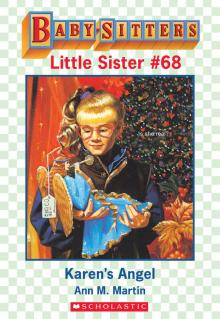 Karen's Angel
Karen's Angel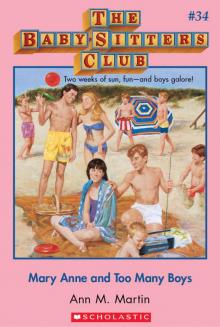 Mary Anne and Too Many Boys
Mary Anne and Too Many Boys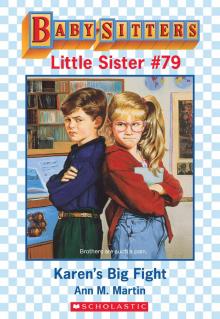 Karen's Big Fight
Karen's Big Fight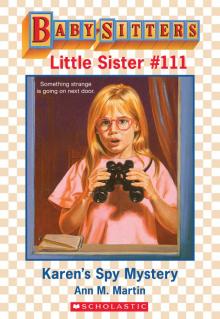 Karen's Spy Mystery
Karen's Spy Mystery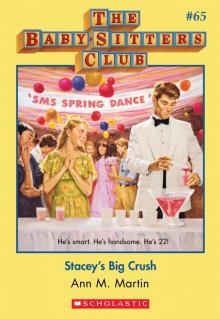 Stacey's Big Crush
Stacey's Big Crush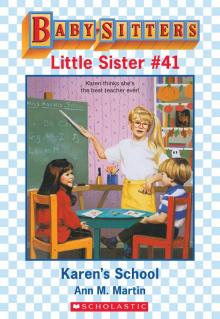 Karen's School
Karen's School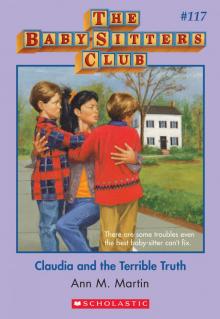 Claudia and the Terrible Truth
Claudia and the Terrible Truth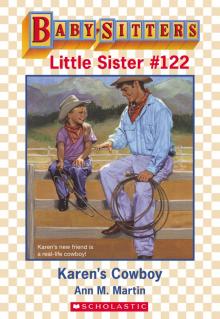 Karen's Cowboy
Karen's Cowboy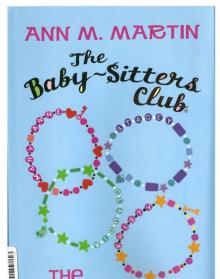 The Summer Before
The Summer Before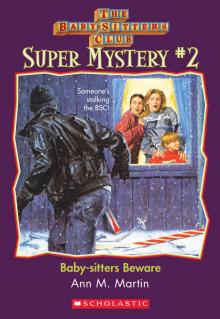 Beware, Dawn!
Beware, Dawn!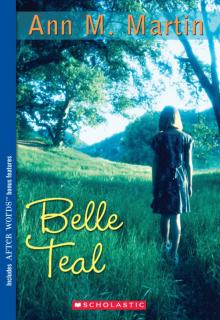 Belle Teale
Belle Teale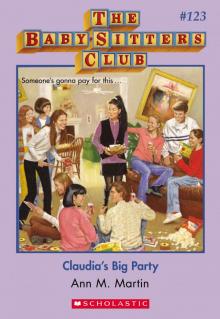 Claudia's Big Party
Claudia's Big Party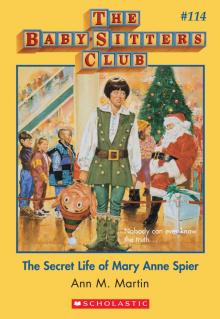 The Secret Life of Mary Anne Spier
The Secret Life of Mary Anne Spier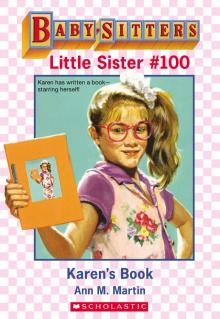 Karen's Book
Karen's Book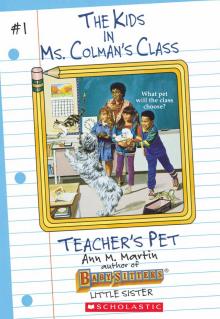 Teacher's Pet
Teacher's Pet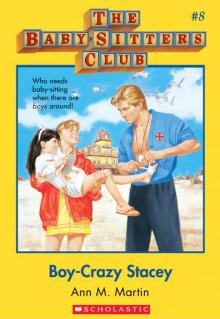 Boy-Crazy Stacey
Boy-Crazy Stacey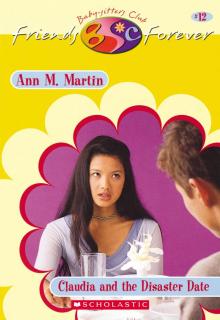 Claudia and the Disaster Date
Claudia and the Disaster Date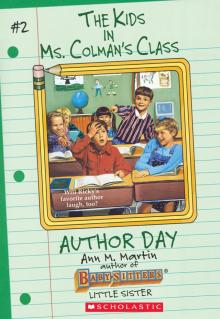 Author Day
Author Day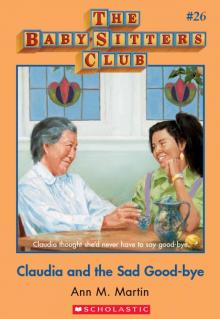 Claudia and the Sad Good-Bye
Claudia and the Sad Good-Bye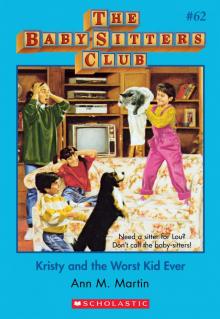 Kristy and the Worst Kid Ever
Kristy and the Worst Kid Ever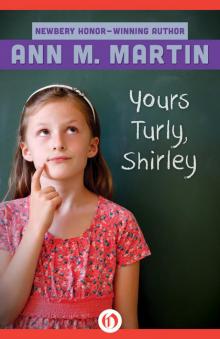 Yours Turly, Shirley
Yours Turly, Shirley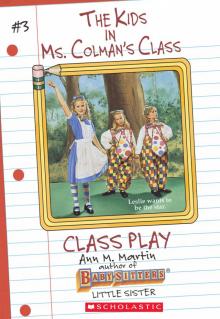 Class Play
Class Play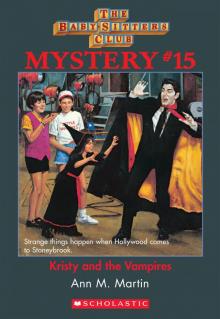 Kristy and the Vampires
Kristy and the Vampires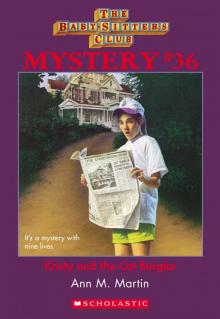 Kristy and the Cat Burglar
Kristy and the Cat Burglar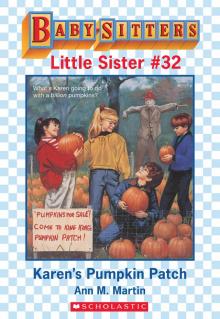 Karen's Pumpkin Patch
Karen's Pumpkin Patch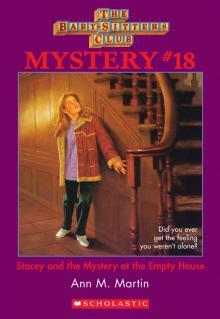 Stacey and the Mystery at the Empty House
Stacey and the Mystery at the Empty House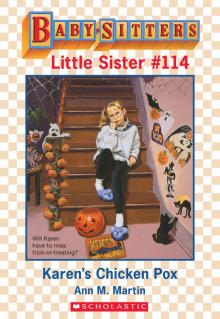 Karen's Chicken Pox
Karen's Chicken Pox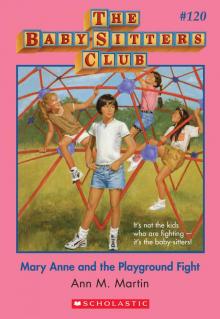 Mary Anne and the Playground Fight
Mary Anne and the Playground Fight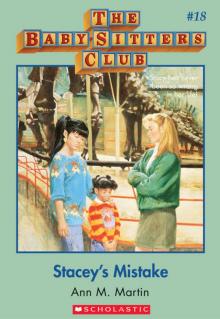 Stacey's Mistake
Stacey's Mistake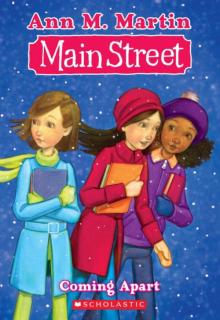 Coming Apart
Coming Apart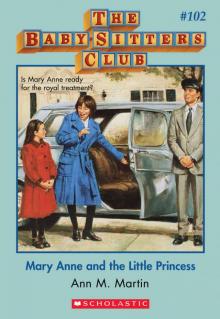 Mary Anne and the Little Princess
Mary Anne and the Little Princess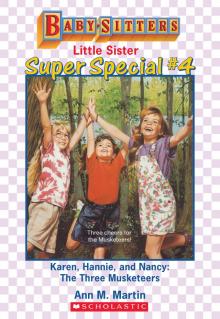 Karen, Hannie and Nancy: The Three Musketeers
Karen, Hannie and Nancy: The Three Musketeers 'Tis the Season
'Tis the Season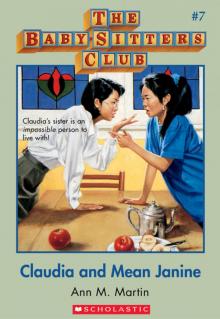 Claudia and Mean Janine
Claudia and Mean Janine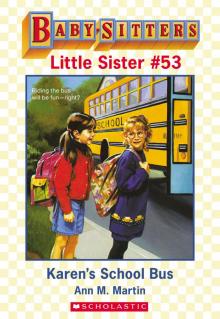 Karen's School Bus
Karen's School Bus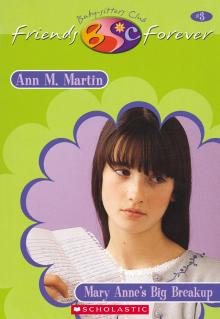 Mary Anne's Big Breakup
Mary Anne's Big Breakup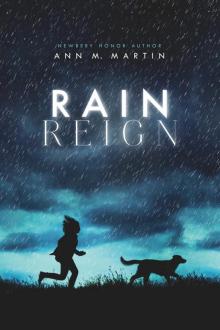 Rain Reign
Rain Reign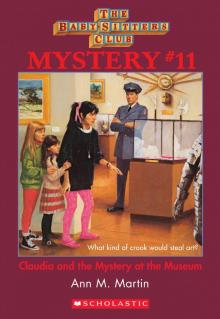 Claudia and the Mystery at the Museum
Claudia and the Mystery at the Museum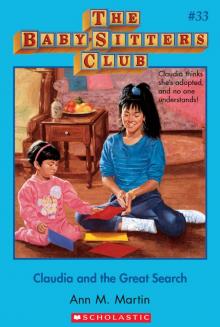 Claudia and the Great Search
Claudia and the Great Search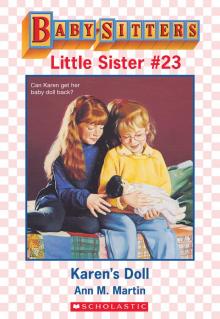 Karen's Doll
Karen's Doll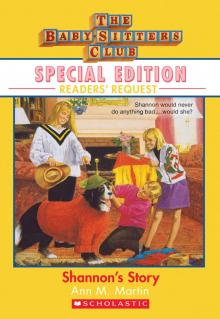 Shannon's Story
Shannon's Story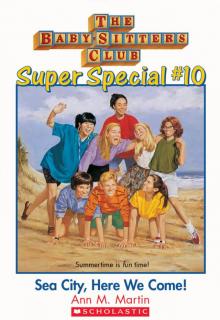 Sea City, Here We Come!
Sea City, Here We Come!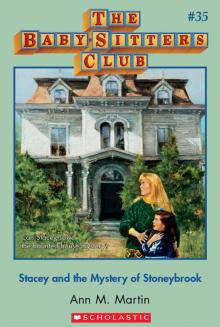 Stacey and the Mystery of Stoneybrook
Stacey and the Mystery of Stoneybrook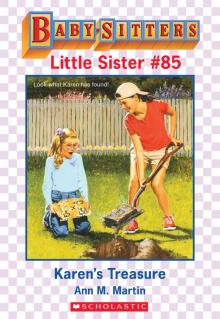 Karen's Treasure
Karen's Treasure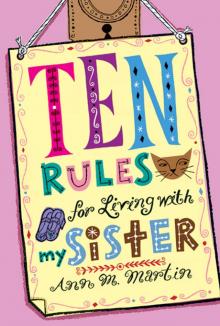 Ten Rules for Living With My Sister
Ten Rules for Living With My Sister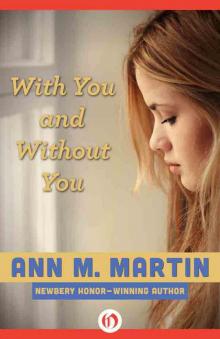 With You and Without You
With You and Without You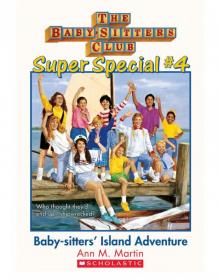 Baby-Sitters' Island Adventure
Baby-Sitters' Island Adventure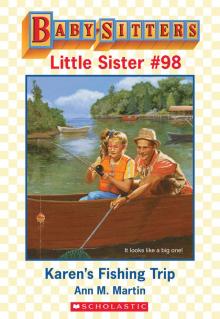 Karen's Fishing Trip
Karen's Fishing Trip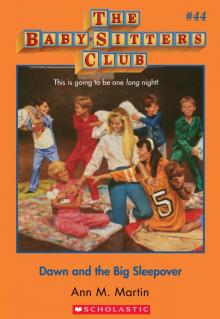 Dawn and the Big Sleepover
Dawn and the Big Sleepover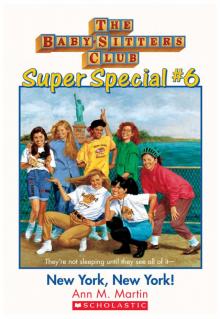 New York, New York!
New York, New York!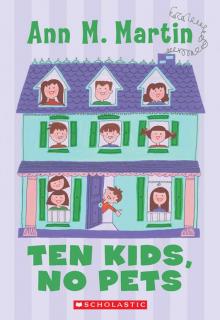 Ten Kids, No Pets
Ten Kids, No Pets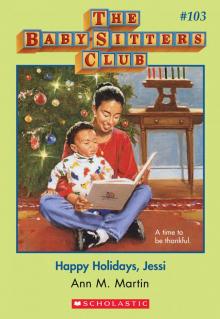 Happy Holidays, Jessi
Happy Holidays, Jessi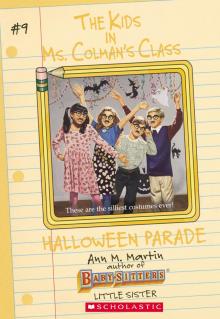 Halloween Parade
Halloween Parade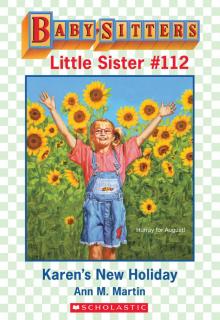 Karen's New Holiday
Karen's New Holiday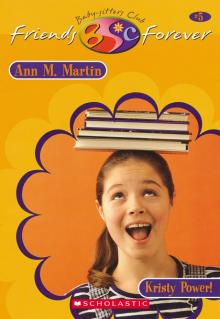 Kristy Power!
Kristy Power!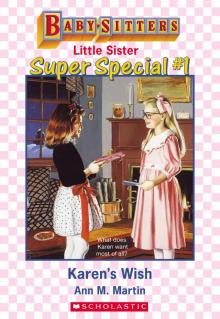 Karen's Wish
Karen's Wish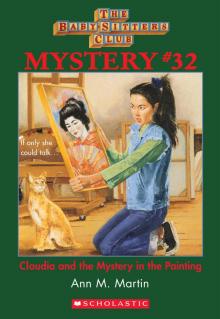 Claudia and the Mystery in the Painting
Claudia and the Mystery in the Painting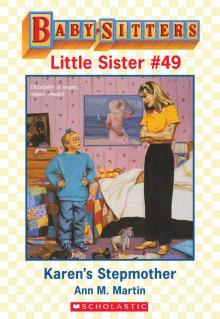 Karen's Stepmother
Karen's Stepmother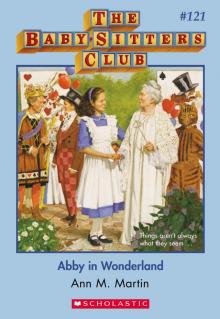 Abby in Wonderland
Abby in Wonderland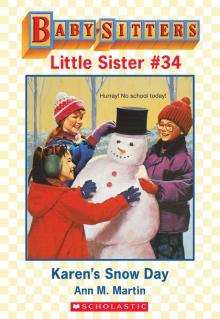 Karen's Snow Day
Karen's Snow Day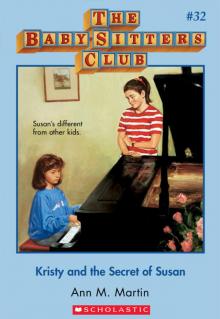 Kristy and the Secret of Susan
Kristy and the Secret of Susan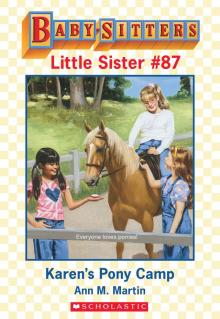 Karen's Pony Camp
Karen's Pony Camp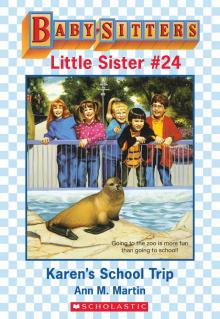 Karen's School Trip
Karen's School Trip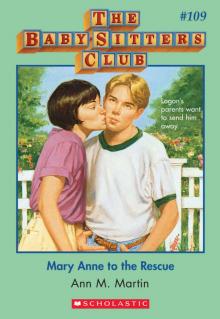 Mary Anne to the Rescue
Mary Anne to the Rescue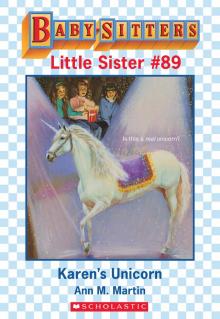 Karen's Unicorn
Karen's Unicorn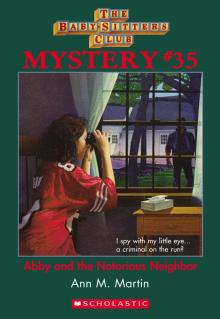 Abby and the Notorious Neighbor
Abby and the Notorious Neighbor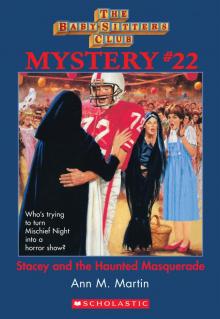 Stacey and the Haunted Masquerade
Stacey and the Haunted Masquerade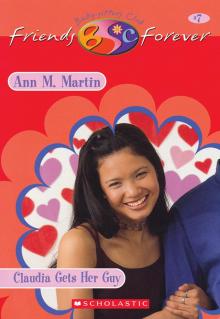 Claudia Gets Her Guy
Claudia Gets Her Guy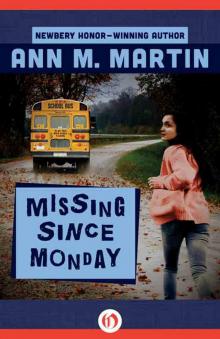 Missing Since Monday
Missing Since Monday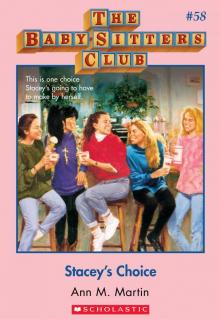 Stacey's Choice
Stacey's Choice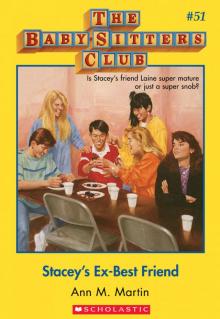 Stacey's Ex-Best Friend
Stacey's Ex-Best Friend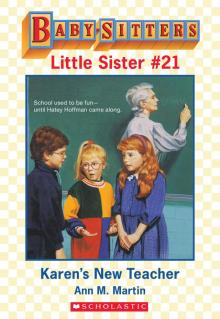 Karen's New Teacher
Karen's New Teacher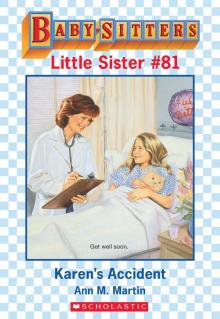 Karen's Accident
Karen's Accident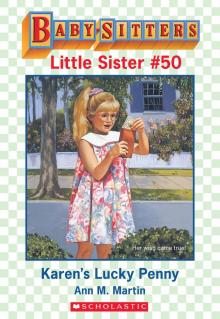 Karen's Lucky Penny
Karen's Lucky Penny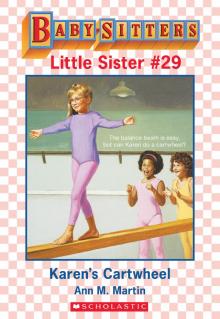 Karen's Cartwheel
Karen's Cartwheel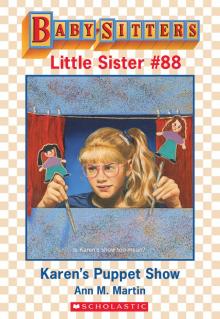 Karen's Puppet Show
Karen's Puppet Show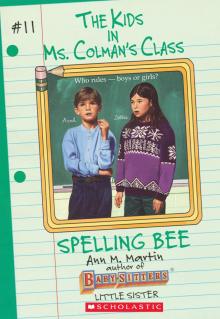 Spelling Bee
Spelling Bee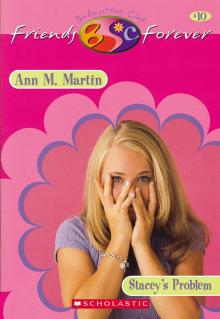 Stacey's Problem
Stacey's Problem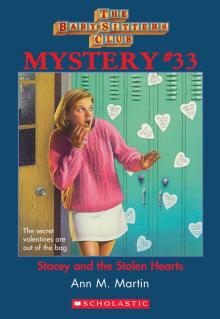 Stacey and the Stolen Hearts
Stacey and the Stolen Hearts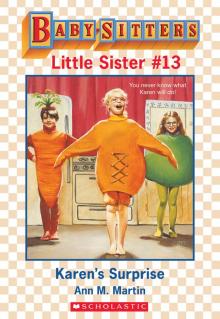 Karen's Surprise
Karen's Surprise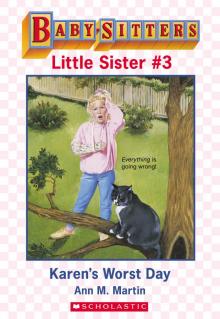 Karen's Worst Day
Karen's Worst Day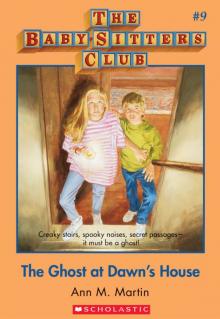 The Ghost at Dawn's House
The Ghost at Dawn's House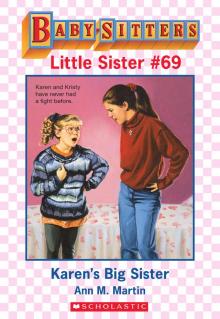 Karen's Big Sister
Karen's Big Sister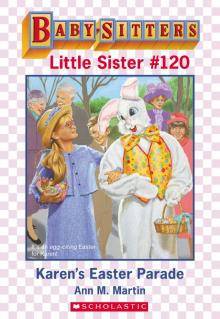 Karen's Easter Parade
Karen's Easter Parade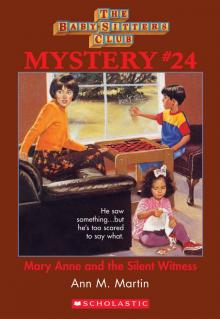 Mary Anne and the Silent Witness
Mary Anne and the Silent Witness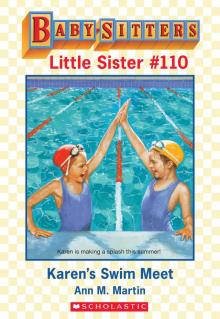 Karen's Swim Meet
Karen's Swim Meet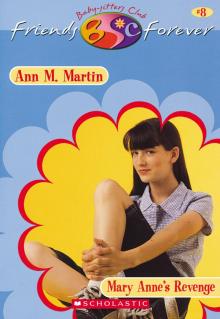 Mary Anne's Revenge
Mary Anne's Revenge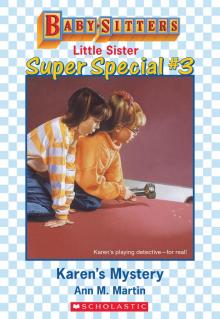 Karen's Mystery
Karen's Mystery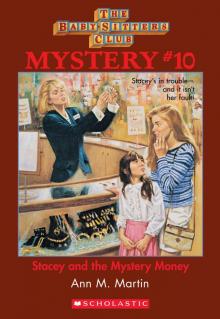 Stacey and the Mystery Money
Stacey and the Mystery Money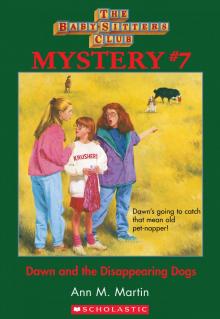 Dawn and the Disappearing Dogs
Dawn and the Disappearing Dogs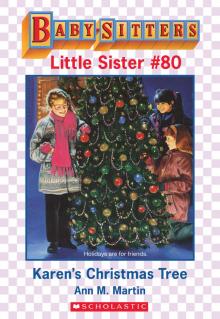 Karen's Christmas Tree
Karen's Christmas Tree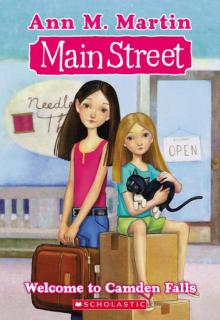 Welcome to Camden Falls
Welcome to Camden Falls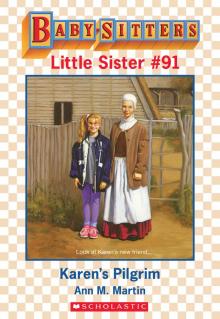 Karen's Pilgrim
Karen's Pilgrim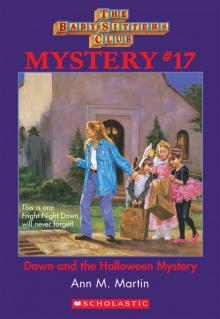 Dawn and the Halloween Mystery
Dawn and the Halloween Mystery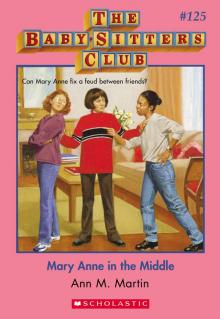 Mary Anne in the Middle
Mary Anne in the Middle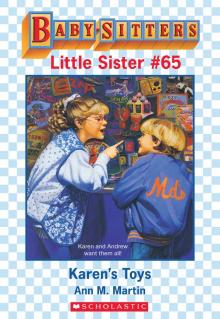 Karen's Toys
Karen's Toys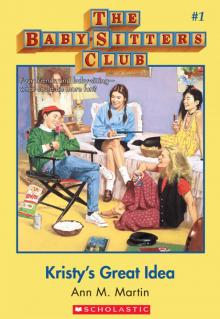 Kristy's Great Idea
Kristy's Great Idea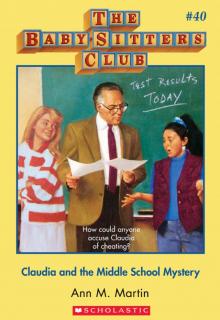 Claudia and the Middle School Mystery
Claudia and the Middle School Mystery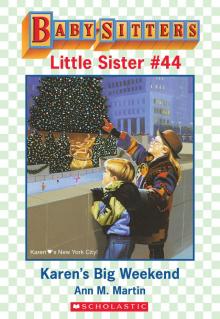 Karen's Big Weekend
Karen's Big Weekend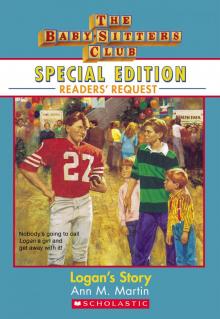 Logan's Story
Logan's Story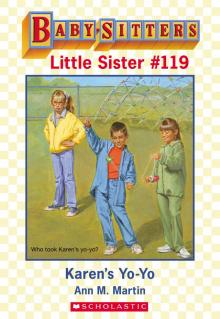 Karen's Yo-Yo
Karen's Yo-Yo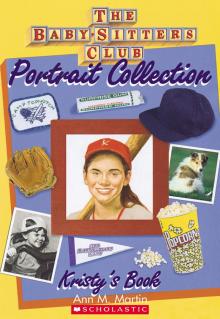 Kristy's Book
Kristy's Book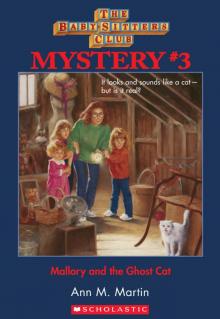 Mallory and the Ghost Cat
Mallory and the Ghost Cat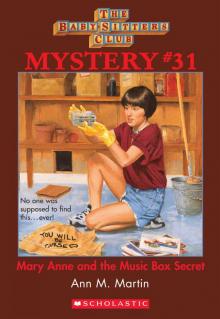 Mary Anne and the Music
Mary Anne and the Music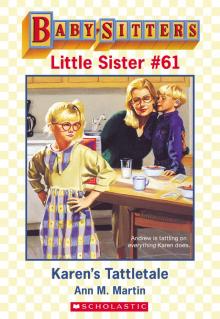 Karen's Tattletale
Karen's Tattletale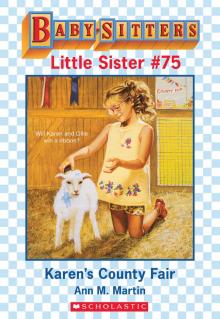 Karen's County Fair
Karen's County Fair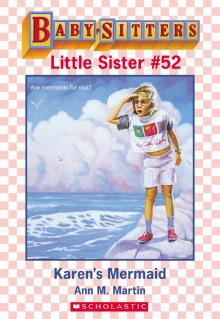 Karen's Mermaid
Karen's Mermaid Snowbound
Snowbound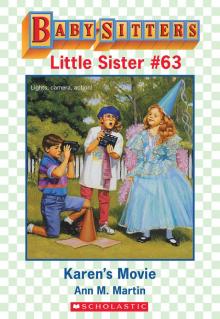 Karen's Movie
Karen's Movie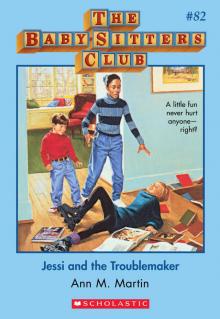 Jessi and the Troublemaker
Jessi and the Troublemaker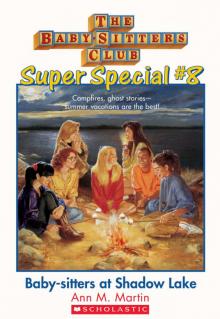 Baby-Sitters at Shadow Lake
Baby-Sitters at Shadow Lake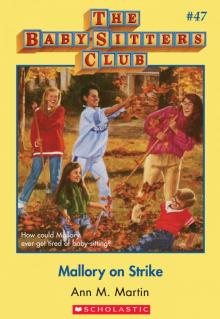 Mallory on Strike
Mallory on Strike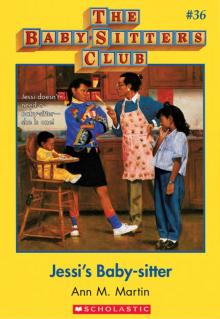 Jessi's Baby-Sitter
Jessi's Baby-Sitter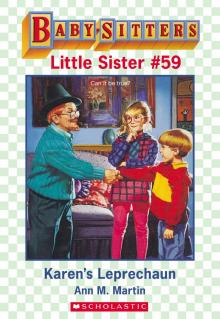 Karen's Leprechaun
Karen's Leprechaun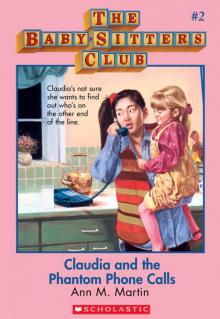 Claudia and the Phantom Phone Calls
Claudia and the Phantom Phone Calls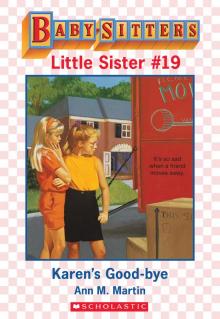 Karen's Good-Bye
Karen's Good-Bye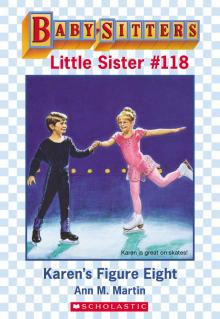 Karen's Figure Eight
Karen's Figure Eight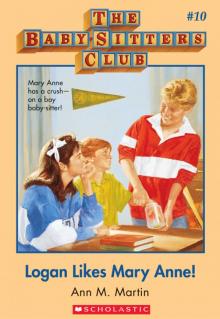 Logan Likes Mary Anne!
Logan Likes Mary Anne!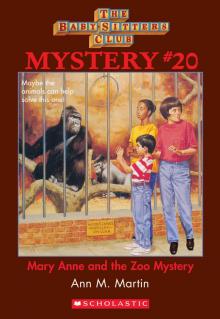 Mary Anne and the Zoo Mystery
Mary Anne and the Zoo Mystery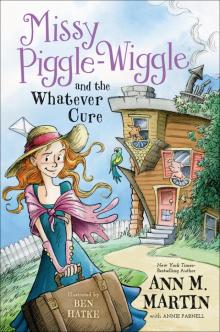 Missy Piggle-Wiggle and the Whatever Cure
Missy Piggle-Wiggle and the Whatever Cure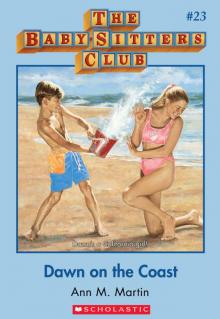 Dawn on the Coast
Dawn on the Coast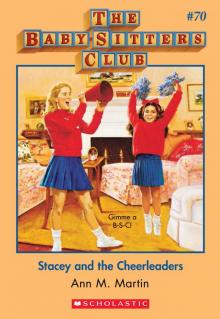 Stacey and the Cheerleaders
Stacey and the Cheerleaders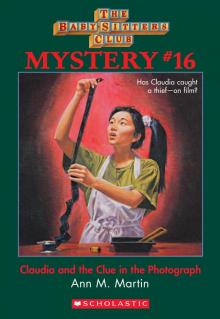 Claudia and the Clue in the Photograph
Claudia and the Clue in the Photograph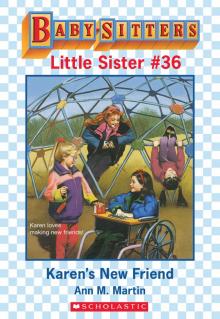 Karen's New Friend
Karen's New Friend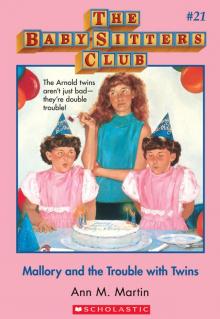 Mallory and the Trouble With Twins
Mallory and the Trouble With Twins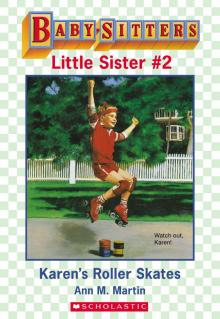 Karen's Roller Skates
Karen's Roller Skates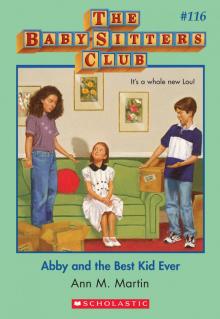 Abby and the Best Kid Ever
Abby and the Best Kid Ever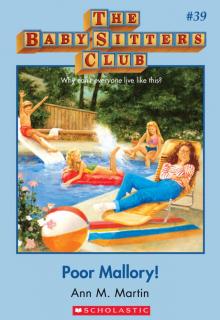 Poor Mallory!
Poor Mallory!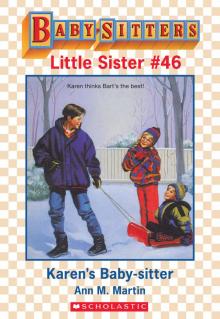 Karen's Witch
Karen's Witch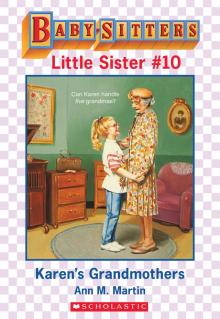 Karen's Grandmothers
Karen's Grandmothers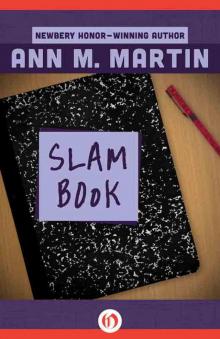 Slam Book
Slam Book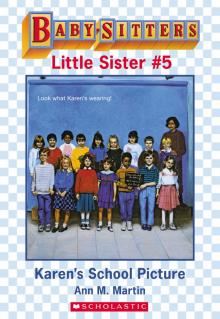 Karen's School Picture
Karen's School Picture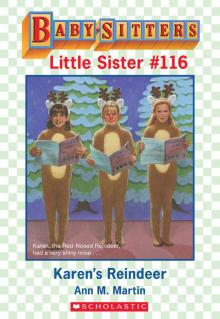 Karen's Reindeer
Karen's Reindeer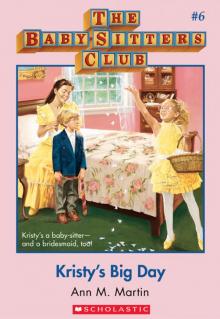 Kristy's Big Day
Kristy's Big Day The Long Way Home
The Long Way Home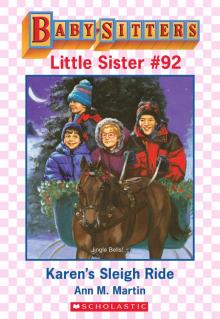 Karen's Sleigh Ride
Karen's Sleigh Ride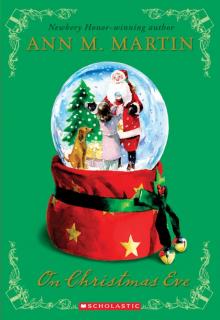 On Christmas Eve
On Christmas Eve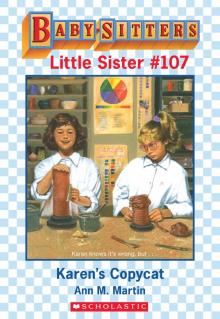 Karen's Copycat
Karen's Copycat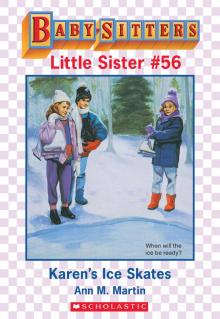 Karen's Ice Skates
Karen's Ice Skates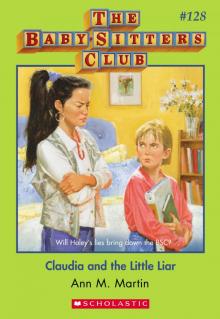 Claudia and the Little Liar
Claudia and the Little Liar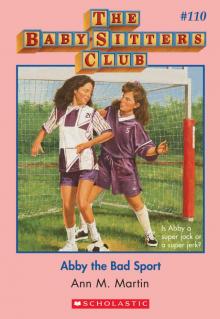 Abby the Bad Sport
Abby the Bad Sport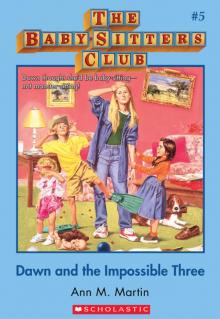 The Baby-Sitters Club #5: Dawn and the Impossible Three
The Baby-Sitters Club #5: Dawn and the Impossible Three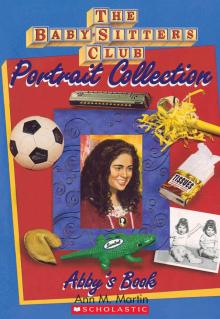 Abby's Book
Abby's Book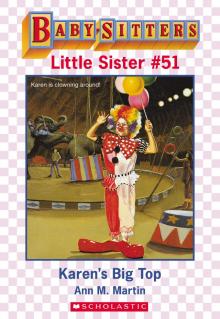 Karen's Big Top
Karen's Big Top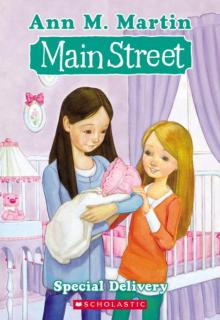 Main Street #8: Special Delivery
Main Street #8: Special Delivery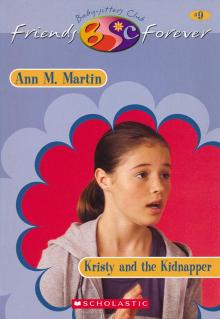 Kristy and the Kidnapper
Kristy and the Kidnapper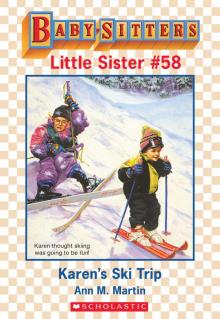 Karen's Ski Trip
Karen's Ski Trip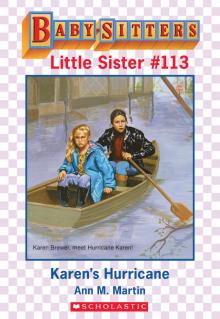 Karen's Hurricane
Karen's Hurricane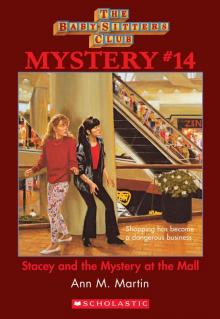 Stacey and the Mystery at the Mall
Stacey and the Mystery at the Mall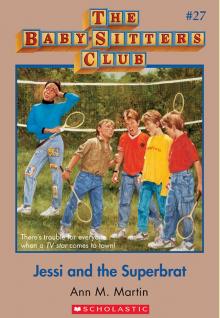 Jessi and the Superbrat
Jessi and the Superbrat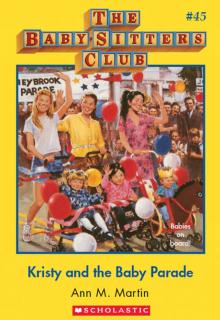 Kristy and the Baby Parade
Kristy and the Baby Parade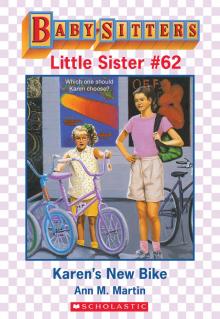 Karen's New Bike
Karen's New Bike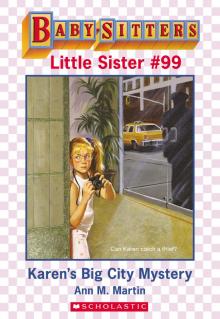 Karen's Big City Mystery
Karen's Big City Mystery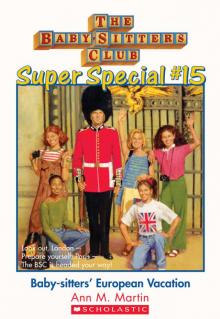 Baby-Sitters' European Vacation
Baby-Sitters' European Vacation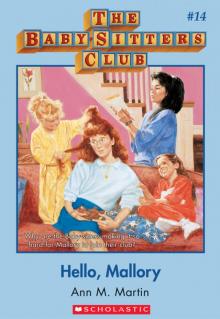 Hello, Mallory
Hello, Mallory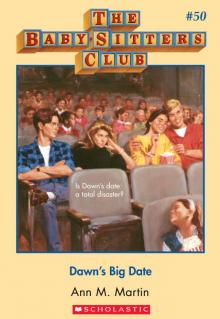 Dawn's Big Date
Dawn's Big Date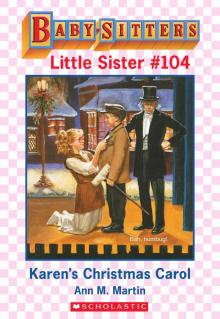 Karen's Christmas Carol
Karen's Christmas Carol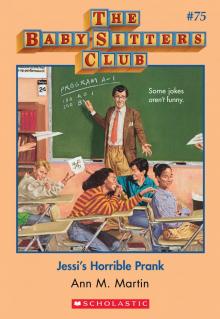 Jessi's Horrible Prank
Jessi's Horrible Prank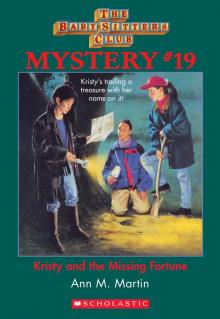 Kristy and the Missing Fortune
Kristy and the Missing Fortune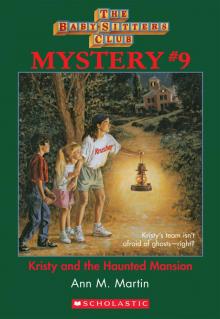 Kristy and the Haunted Mansion
Kristy and the Haunted Mansion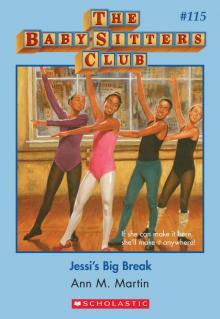 Jessi's Big Break
Jessi's Big Break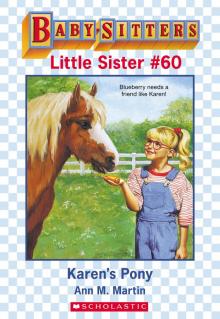 Karen's Pony
Karen's Pony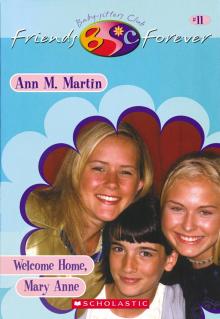 Welcome Home, Mary Anne
Welcome Home, Mary Anne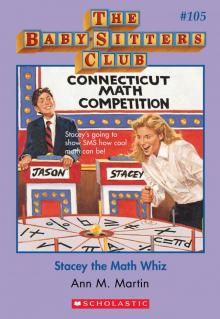 Stacey the Math Whiz
Stacey the Math Whiz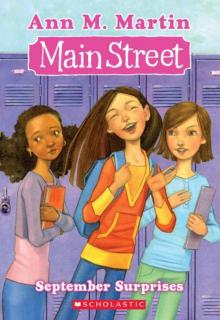 September Surprises
September Surprises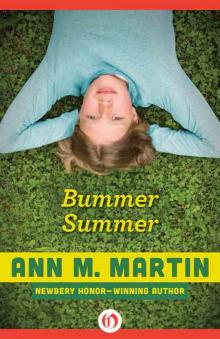 Bummer Summer
Bummer Summer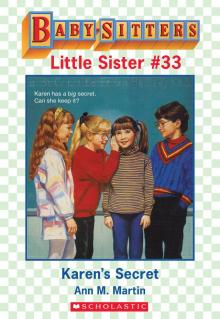 Karen's Secret
Karen's Secret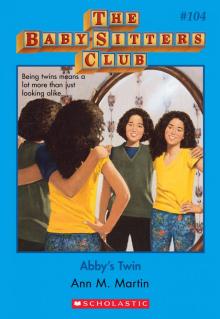 Abby's Twin
Abby's Twin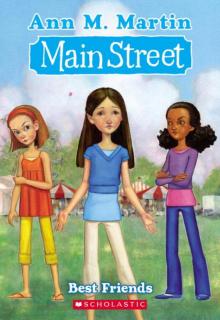 Main Street #4: Best Friends
Main Street #4: Best Friends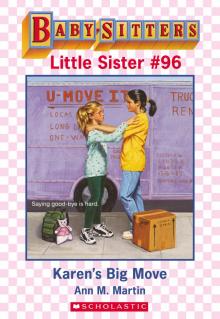 Karen's Big Move
Karen's Big Move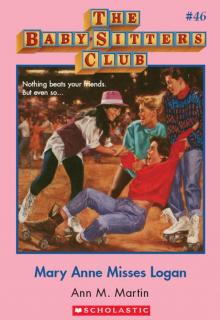 Mary Anne Misses Logan
Mary Anne Misses Logan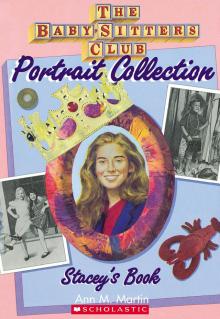 Stacey's Book
Stacey's Book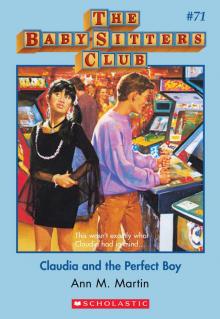 Claudia and the Perfect Boy
Claudia and the Perfect Boy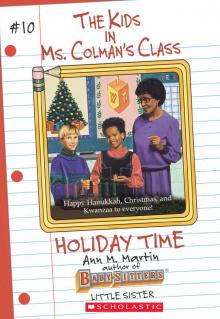 Holiday Time
Holiday Time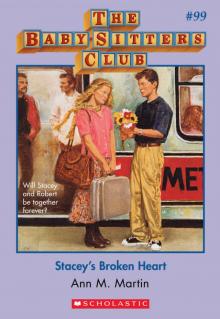 Stacey's Broken Heart
Stacey's Broken Heart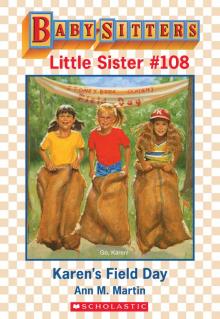 Karen's Field Day
Karen's Field Day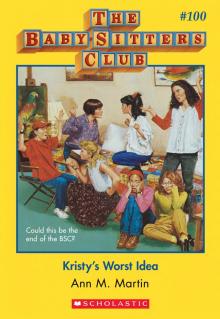 Kristy's Worst Idea
Kristy's Worst Idea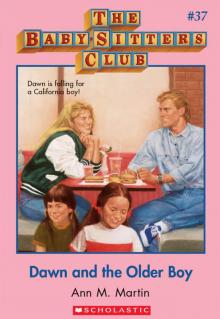 Dawn and the Older Boy
Dawn and the Older Boy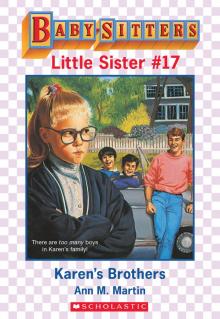 Karen's Brothers
Karen's Brothers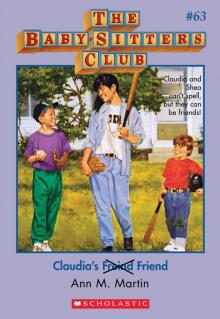 Claudia's Friend
Claudia's Friend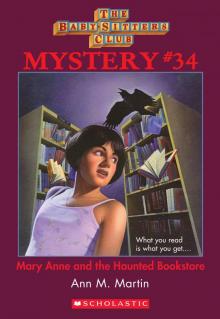 Mary Anne and the Haunted Bookstore
Mary Anne and the Haunted Bookstore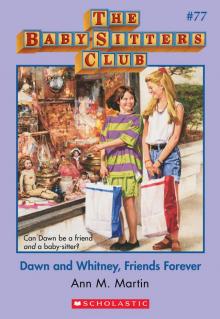 Dawn and Whitney, Friends Forever
Dawn and Whitney, Friends Forever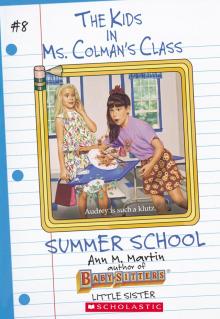 Summer School
Summer School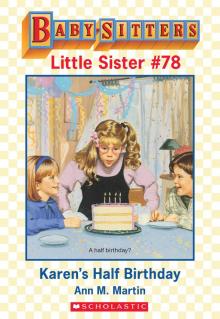 Karen's Birthday
Karen's Birthday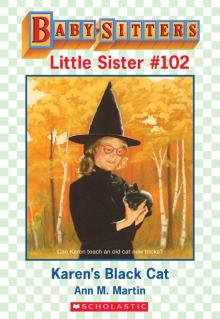 Karen's Black Cat
Karen's Black Cat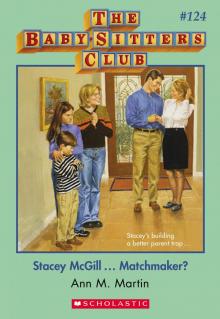 Stacey McGill... Matchmaker?
Stacey McGill... Matchmaker?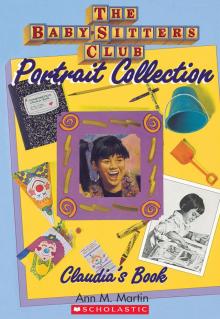 Claudia's Book
Claudia's Book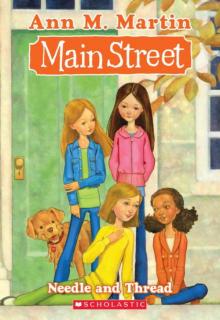 Main Street #2: Needle and Thread
Main Street #2: Needle and Thread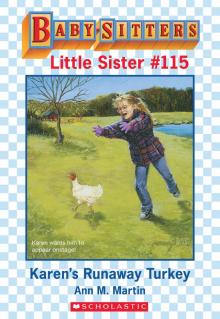 Karen's Runaway Turkey
Karen's Runaway Turkey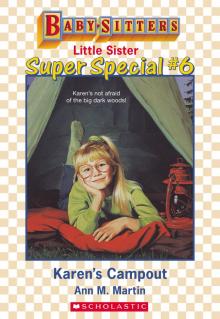 Karen's Campout
Karen's Campout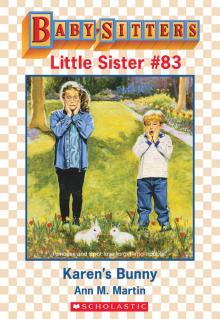 Karen's Bunny
Karen's Bunny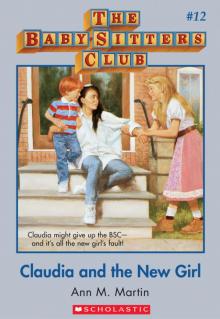 Claudia and the New Girl
Claudia and the New Girl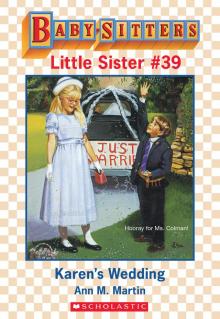 Karen's Wedding
Karen's Wedding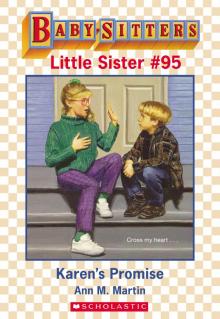 Karen's Promise
Karen's Promise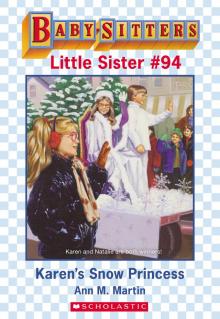 Karen's Snow Princess
Karen's Snow Princess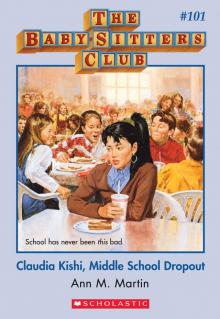 Claudia Kishi, Middle School Dropout
Claudia Kishi, Middle School Dropout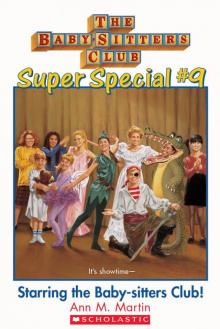 Starring the Baby-Sitters Club!
Starring the Baby-Sitters Club!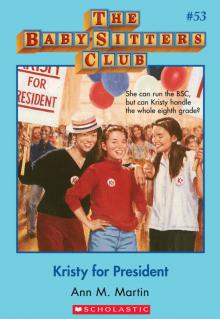 Kristy for President
Kristy for President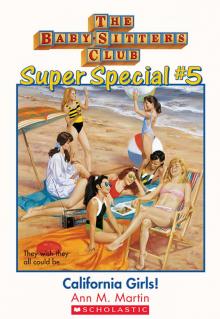 California Girls!
California Girls!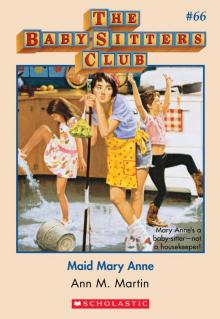 Maid Mary Anne
Maid Mary Anne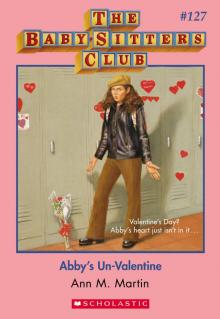 Abby's Un-Valentine
Abby's Un-Valentine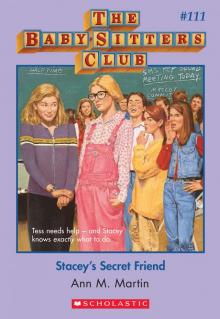 Stacey's Secret Friend
Stacey's Secret Friend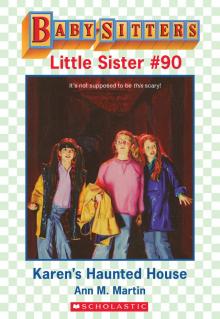 Karen's Haunted House
Karen's Haunted House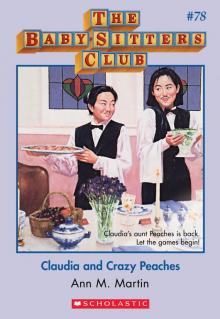 Claudia and Crazy Peaches
Claudia and Crazy Peaches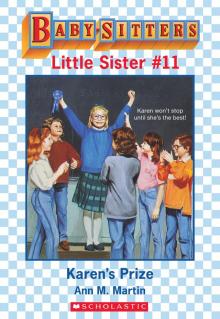 Karen's Prize
Karen's Prize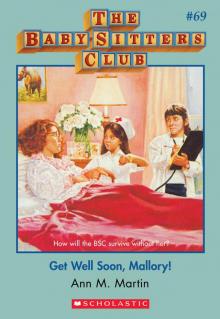 Get Well Soon, Mallory!
Get Well Soon, Mallory!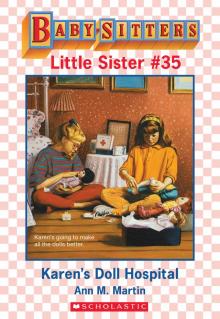 Karen's Doll Hospital
Karen's Doll Hospital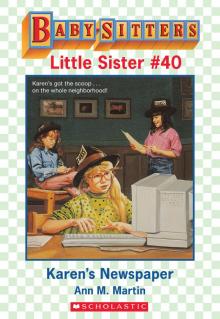 Karen's Newspaper
Karen's Newspaper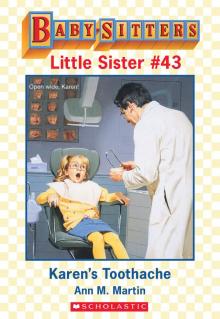 Karen's Toothache
Karen's Toothache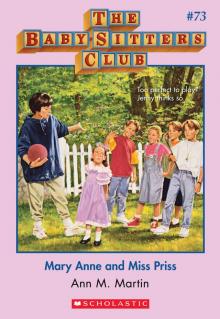 Mary Anne and Miss Priss
Mary Anne and Miss Priss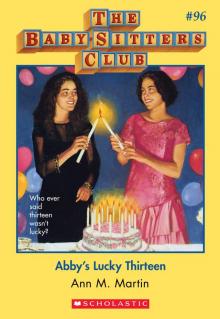 Abby's Lucky Thirteen
Abby's Lucky Thirteen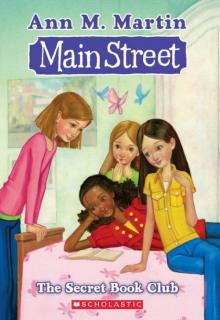 The Secret Book Club
The Secret Book Club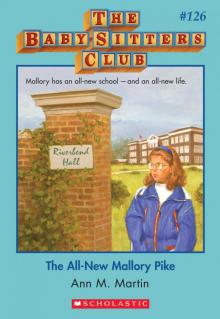 The All-New Mallory Pike
The All-New Mallory Pike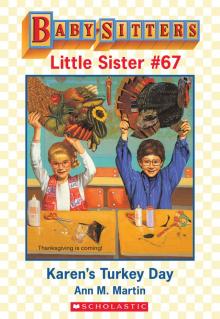 Karen's Turkey Day
Karen's Turkey Day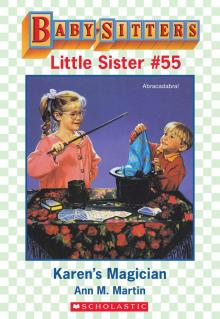 Karen's Magician
Karen's Magician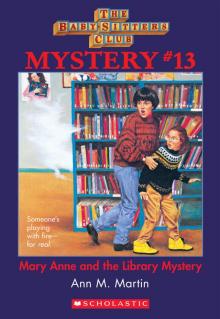 Mary Anne and the Library Mystery
Mary Anne and the Library Mystery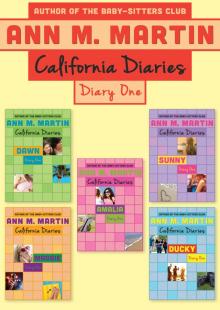 Diary One: Dawn, Sunny, Maggie, Amalia, and Ducky
Diary One: Dawn, Sunny, Maggie, Amalia, and Ducky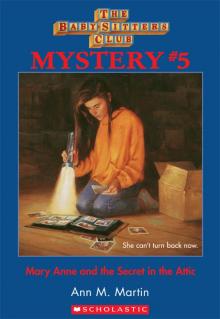 Mary Anne and the Secret in the Attic
Mary Anne and the Secret in the Attic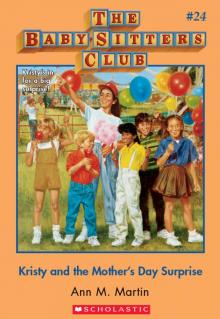 Kristy and the Mother's Day Surprise
Kristy and the Mother's Day Surprise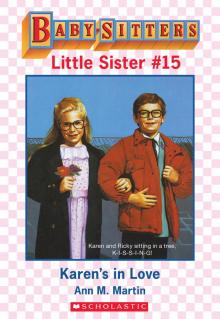 Karen's in Love
Karen's in Love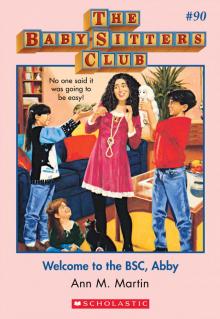 Welcome to the BSC, Abby
Welcome to the BSC, Abby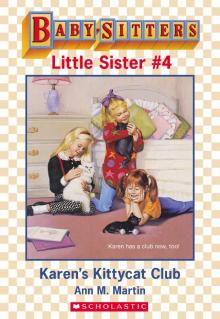 Karen's Kittycat Club
Karen's Kittycat Club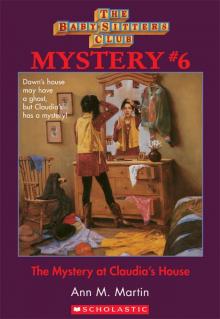 The Mystery at Claudia's House
The Mystery at Claudia's House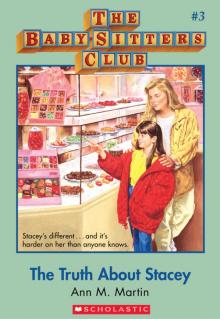 The Truth About Stacey
The Truth About Stacey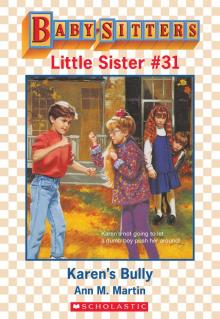 Karen's Bully
Karen's Bully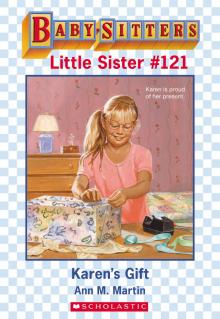 Karen's Gift
Karen's Gift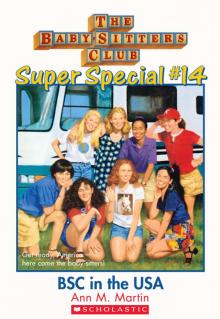 BSC in the USA
BSC in the USA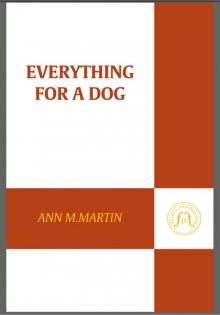 Everything for a Dog
Everything for a Dog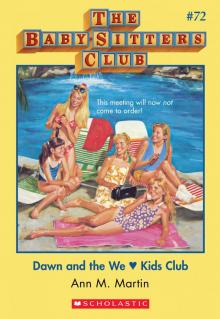 Dawn and the We Love Kids Club
Dawn and the We Love Kids Club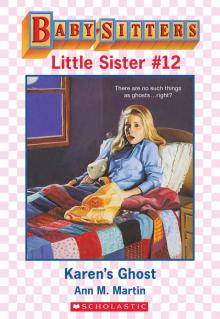 Karen's Ghost
Karen's Ghost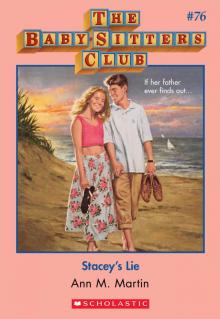 Stacey's Lie
Stacey's Lie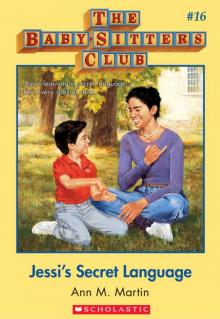 Jessi's Secret Language
Jessi's Secret Language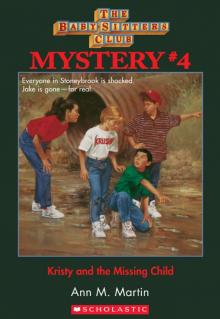 Kristy and the Missing Child
Kristy and the Missing Child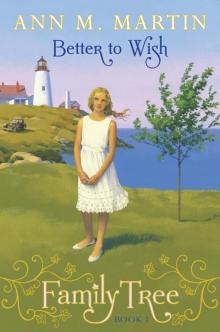 Better to Wish
Better to Wish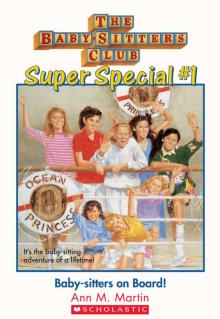 Baby-Sitters on Board!
Baby-Sitters on Board!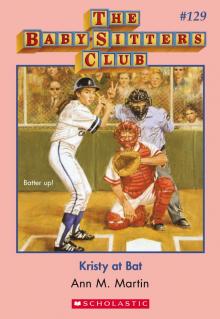 Kristy at Bat
Kristy at Bat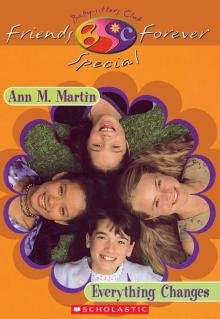 Everything Changes
Everything Changes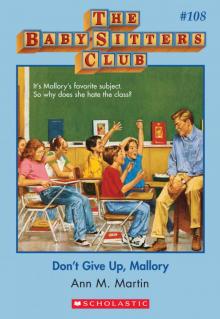 Don't Give Up, Mallory
Don't Give Up, Mallory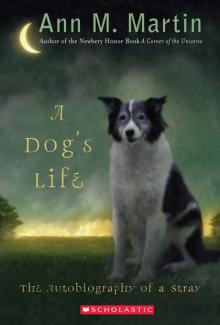 A Dog's Life: The Autobiography of a Stray
A Dog's Life: The Autobiography of a Stray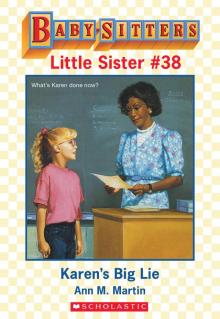 Karen's Big Lie
Karen's Big Lie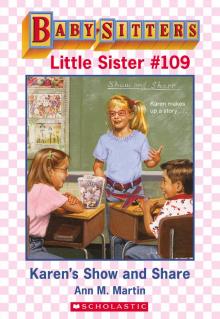 Karen's Show and Share
Karen's Show and Share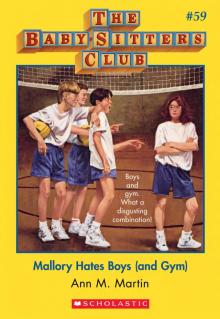 Mallory Hates Boys (and Gym)
Mallory Hates Boys (and Gym)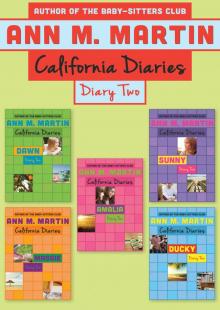 Diary Two: Dawn, Sunny, Maggie, Amalia, and Ducky
Diary Two: Dawn, Sunny, Maggie, Amalia, and Ducky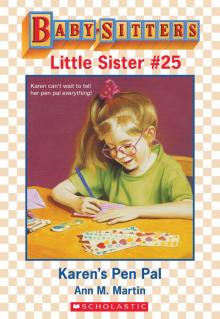 Karen's Pen Pal
Karen's Pen Pal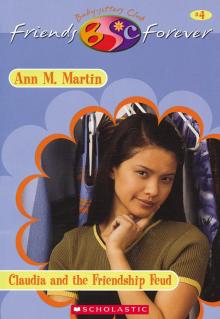 Claudia and the Friendship Feud
Claudia and the Friendship Feud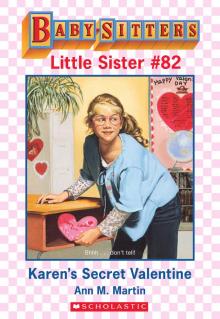 Karen's Secret Valentine
Karen's Secret Valentine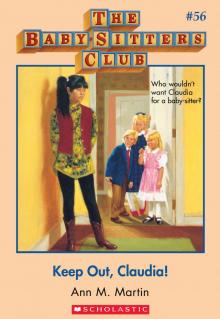 Keep Out, Claudia!
Keep Out, Claudia!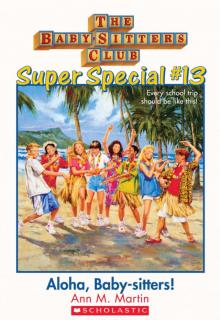 Aloha, Baby-Sitters!
Aloha, Baby-Sitters!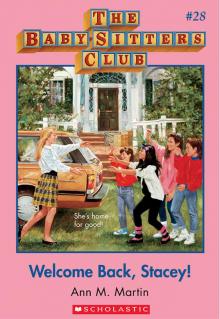 Welcome Back, Stacey
Welcome Back, Stacey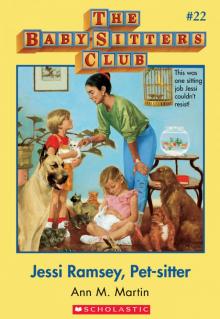 Jessi Ramsey, Pet-Sitter
Jessi Ramsey, Pet-Sitter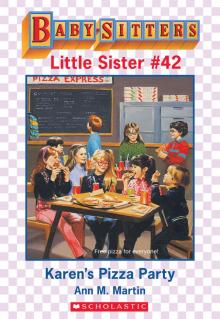 Karen's Pizza Party
Karen's Pizza Party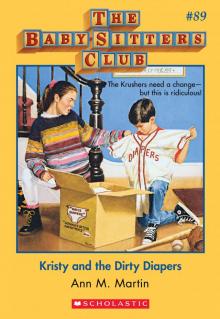 Kristy and the Dirty Diapers
Kristy and the Dirty Diapers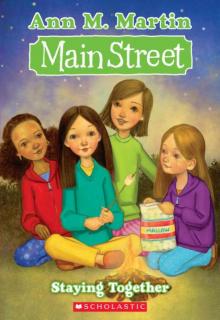 Staying Together
Staying Together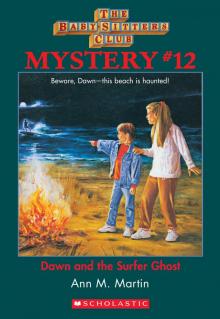 Dawn and the Surfer Ghost
Dawn and the Surfer Ghost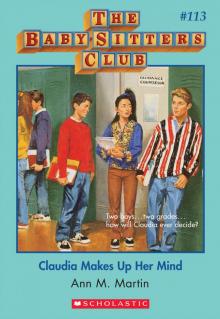 Claudia Makes Up Her Mind
Claudia Makes Up Her Mind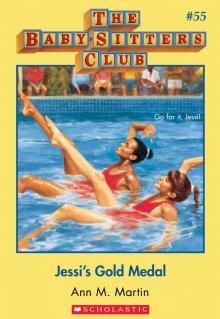 Jessi's Gold Medal
Jessi's Gold Medal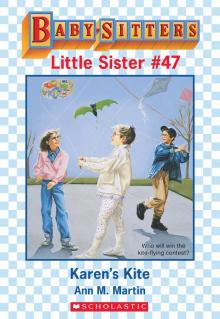 Karen's Kite
Karen's Kite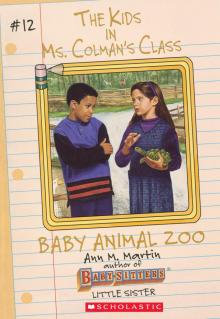 Baby Animal Zoo
Baby Animal Zoo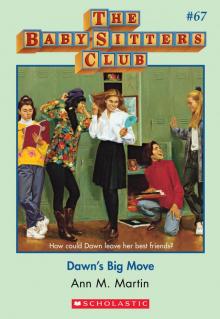 Dawn's Big Move
Dawn's Big Move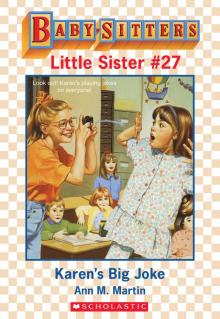 Karen's Big Joke
Karen's Big Joke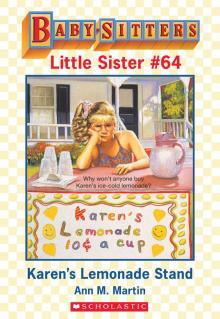 Karen's Lemonade Stand
Karen's Lemonade Stand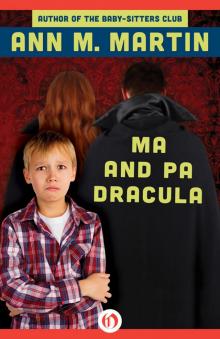 Ma and Pa Dracula
Ma and Pa Dracula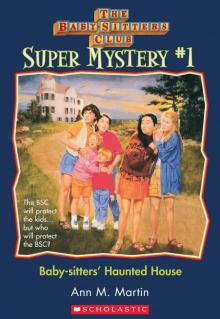 Baby-Sitters' Haunted House
Baby-Sitters' Haunted House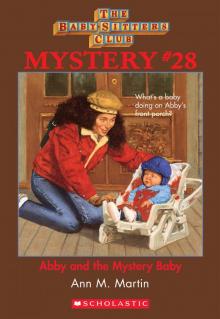 Abby and the Mystery Baby
Abby and the Mystery Baby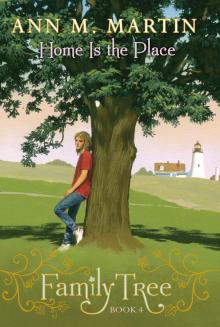 Home Is the Place
Home Is the Place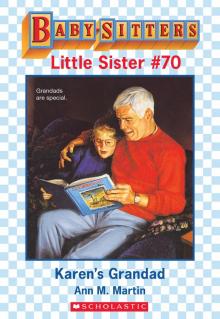 Karen's Grandad
Karen's Grandad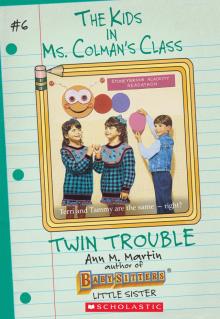 Twin Trouble
Twin Trouble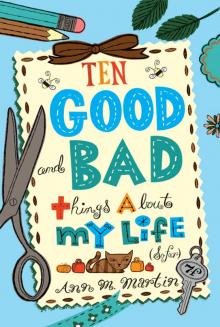 Ten Good and Bad Things About My Life (So Far)
Ten Good and Bad Things About My Life (So Far)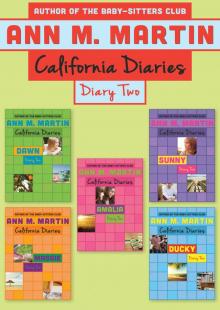 Diary Two
Diary Two Baby-Sitters Club 027
Baby-Sitters Club 027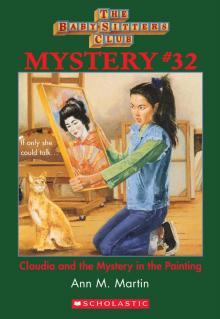 Claudia and the Mystery Painting
Claudia and the Mystery Painting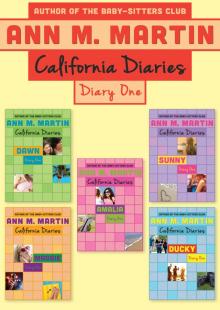 Diary One
Diary One Baby-Sitters Club 037
Baby-Sitters Club 037 Baby-Sitters Club 028
Baby-Sitters Club 028 Baby-Sitters Club 085
Baby-Sitters Club 085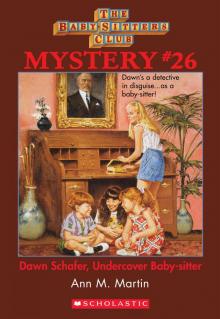 Dawn Schaffer Undercover Baby-Sitter
Dawn Schaffer Undercover Baby-Sitter Jessi's Babysitter
Jessi's Babysitter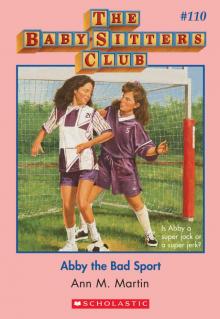 The Baby-Sitters Club #110: Abby the Bad Sport (Baby-Sitters Club, The)
The Baby-Sitters Club #110: Abby the Bad Sport (Baby-Sitters Club, The) Karen's Little Sister
Karen's Little Sister Baby-Sitters Club 058
Baby-Sitters Club 058 Claudia And The Genius On Elm St.
Claudia And The Genius On Elm St.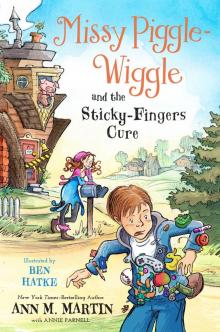 Missy Piggle-Wiggle and the Sticky-Fingers Cure
Missy Piggle-Wiggle and the Sticky-Fingers Cure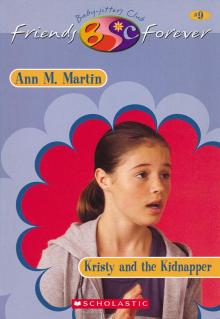 Kristy and Kidnapper
Kristy and Kidnapper Baby-Sitters Club 041
Baby-Sitters Club 041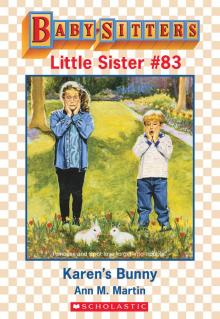 Karen's Bunny Trouble
Karen's Bunny Trouble Baby-Sitters Club 032
Baby-Sitters Club 032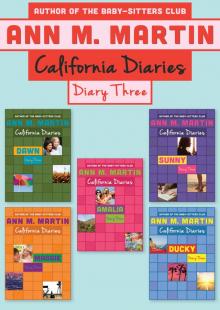 Diary Three
Diary Three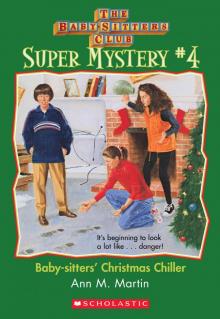 Christmas Chiller
Christmas Chiller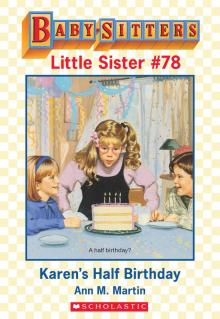 Karen's Half-Birthday
Karen's Half-Birthday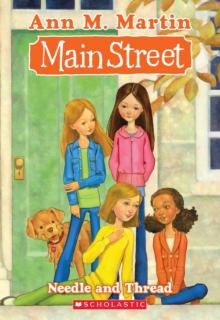 Needle and Thread
Needle and Thread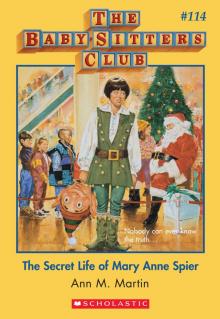 Secret Life of Mary Anne Spier
Secret Life of Mary Anne Spier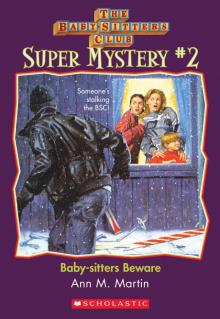 Baby-Sitters Beware
Baby-Sitters Beware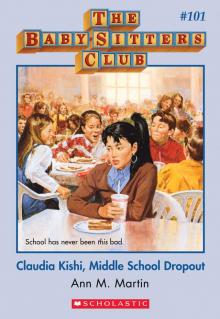 Claudia Kishi, Middle School Drop-Out
Claudia Kishi, Middle School Drop-Out Logan Likes Mary Anne !
Logan Likes Mary Anne ! Baby-Sitters Club 061
Baby-Sitters Club 061 Best Friends
Best Friends Baby-Sitters Club 031
Baby-Sitters Club 031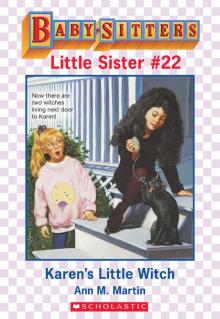 Karen's Little Witch
Karen's Little Witch Jessi Ramsey, Petsitter
Jessi Ramsey, Petsitter Baby-Sitters Club 123
Baby-Sitters Club 123 Baby-Sitters Club 059
Baby-Sitters Club 059 Baby-Sitters Club 033
Baby-Sitters Club 033 Baby-Sitters Club 060
Baby-Sitters Club 060 Baby-Sitters Club 094
Baby-Sitters Club 094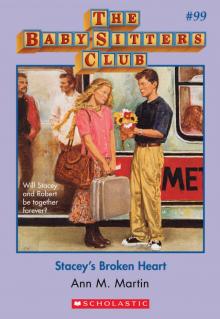 The Baby-Sitters Club #99: Stacey's Broken Heart
The Baby-Sitters Club #99: Stacey's Broken Heart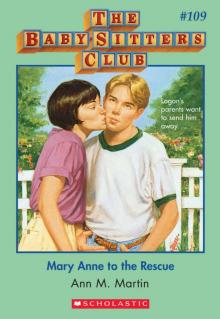 The Baby-Sitters Club #109: Mary Anne to the Rescue (Baby-Sitters Club, The)
The Baby-Sitters Club #109: Mary Anne to the Rescue (Baby-Sitters Club, The) Mystery At Claudia's House
Mystery At Claudia's House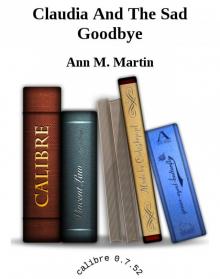 Claudia And The Sad Goodbye
Claudia And The Sad Goodbye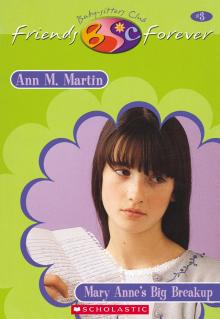 Mary Anne's Big Break-Up
Mary Anne's Big Break-Up Baby-Sitters Club 025
Baby-Sitters Club 025 Baby-Sitters Club 042
Baby-Sitters Club 042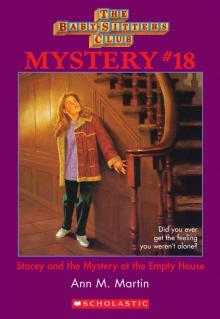 Stacey and the Mystery of the Empty House
Stacey and the Mystery of the Empty House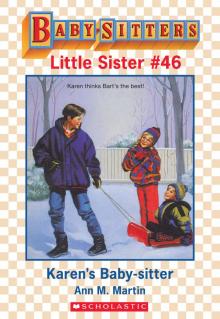 Karen's Baby-Sitter
Karen's Baby-Sitter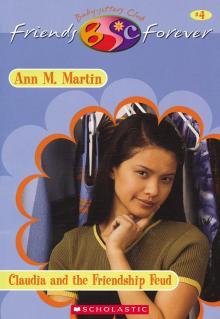 Claudia's Friendship Feud
Claudia's Friendship Feud Baby-Sitters Club 090
Baby-Sitters Club 090 Baby-Sitters Club 021
Baby-Sitters Club 021 Baby-Sitters Club 056
Baby-Sitters Club 056 Baby-Sitters Club 040
Baby-Sitters Club 040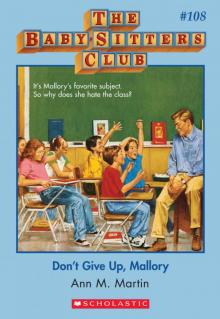 The Baby-Sitters Club #108: Don't Give Up, Mallory (Baby-Sitters Club, The)
The Baby-Sitters Club #108: Don't Give Up, Mallory (Baby-Sitters Club, The)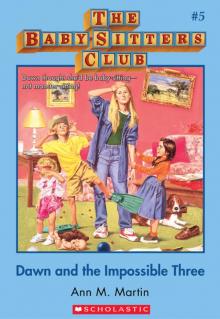 Dawn and the Impossible Three
Dawn and the Impossible Three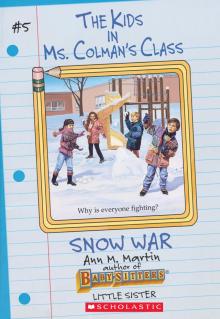 The Snow War
The Snow War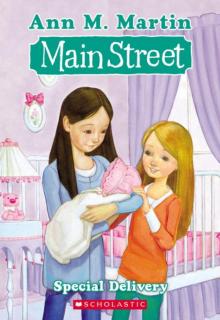 Special Delivery
Special Delivery Baby-Sitters Club 057
Baby-Sitters Club 057 Mary Anne And Too Many Babies
Mary Anne And Too Many Babies Baby-Sitters Club 030
Baby-Sitters Club 030